Text
A rite of passage: hasta el sur
Story and photos by Jeremy Turley, spring 2018 travel writer at La Universidad de los Andes in Santiago, Chile
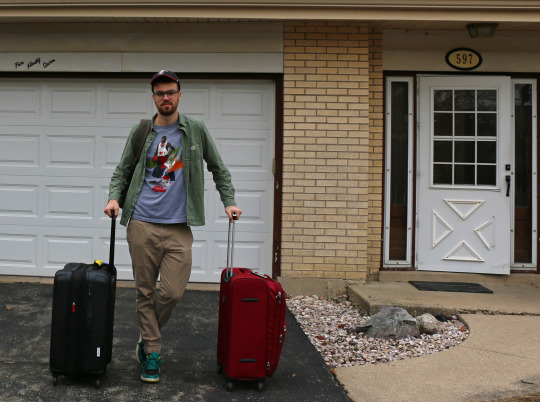
HIGHLAND PARK, IL — Pardon the dateline, but I couldn’t resist. At the moment, I sit in my living room surrounded by packing lists, suitcases and freshly-laundered clothes. I leave tomorrow for what I hope will be the southern excursion of a lifetime. Only twelve hours in an airplane lie between me and Santiago de Chile.
In physical preparation, I am a procrastinator in the truest sense of the word. I have yet to pack what I need to take with me, and I have scrambled to get my finances and travel preparations in order. Though in mental preparation, I am already there.
Since early childhood, I have viewed a semester in Latin America as a rite of passage. My mother studied in Mexico City nearly 35 years ago, and the experience has formed her life philosophy and professional arc more than any other. She learned to speak Spanish, saw firsthand the challenges of living outside the U.S. and became an immigration lawyer upon returning home. Now, most of her clients come from Mexico. She has become one of the most trusted gringa lawyers for Latinos in the Chicagoland area.
When I was a little kid, my mom used to tell me about her time there. Even though college seemed so far away, I always knew I would make the pilgrimage south. Finally, I have gotten the chance to do so. You could say I’ve been waiting a long time for this.
In the tradition of procrastination, I have waited until a few days before my departure to square away my housing situation and buy the things on my packing list. However, my preparation started, in earnest, about a month and a half ago.
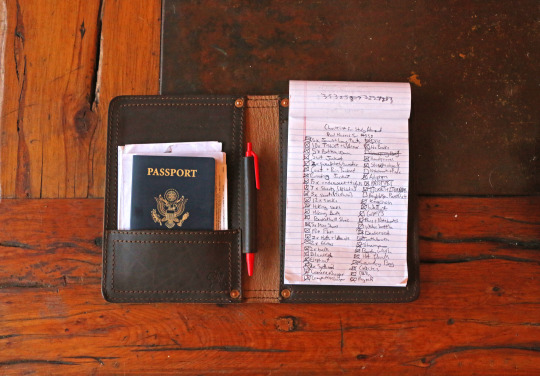
I was warned by study abroad coordinators (and my mother) about the visa process, a thorn in the side of every exchange student. For me, it also served as a wake-up call. The documents I turned over to the Chilean consulate were official in nature: police background checks, good health certificates and proof of financial solvency. While acquiring these materials, it finally began to feel real — I would be willfully abandoning the comfort of my home, university and native language in a just few short weeks.
That realization probably should have scared the hell out of me. Instead, it generated an excitement within me. I have always enjoyed venturing into the unknown, whether it be an unfamiliar place or a new mental challenge. Chile is sure to be full of both.
Perhaps the greatest challenge will be the language. I have studied Spanish for many years in many classrooms, but 50 minutes a day of language courses cannot adequately prepare someone to interact with native speakers in a foreign country. In Chile, I will need the Spanish skills to earn more than just good grades. I hope to earn a spot as a functioning and communicative member of Chilean society. By the end of my time there, I want to be able to live as they do, and an inability to properly speak their language would certainly prevent this.
Since the Chilean semester doesn’t start until late February, I have been out of school for nearly two months. In December I felt somewhat confident in my Spanish-speaking abilities because I had just finished a fabulous course at Mizzou (Spanish in America with Asier Alcázar). Alas, my gains in that area have since abated, and a few weeks ago, I could barely express my most basic thoughts. In an attempt to be proactive, I recently started listening to Spanish-language podcasts (namely NPR’s Radio Ambulante) and speaking in Spanish with my mom. Hopefully, I’ll at least be able to ask the questions necessary to survive in Chile, though I still worry about how I will fare down there.
Since my main goal is to solidify Spanish fluency, I have opted to live with a Chilean family in Santiago. I was warned about the uncertainties of a family stay, but it seems I have lucked out.
From what I can tell through email communication, my host mother, Mariana, seems like a lovely person, and the living situation seems almost too ideal. She has two children, one of whom is my age and several pets (I suppose this could be very much not ideal for a person with allergies). In addition, the house is only a bus ride away from my university. I hope living with them will help me learn conversational Spanish in a way that I couldn’t, had I chosen to live with other foreign students.
I am very excited to meet them in two days, and I hope to form some strong relationships under their roof.
Finally, I would like to offer some practical advice to future exchange students. I suspect that most of the readers of this blog will be students looking to go abroad.
Take the visa application process more seriously than I did. I thought it would be easy to obtain a visa, when in fact, the bureaucracies that make it somewhat difficult. The hardest thing for me to find was the state police background report. It took me a 2-hour drive to Joliet, Illinois and more than a week in all to get this document. The consulates (which are usually located in big cities) cannot process a request until all the paperwork is filed, and because of the background report, I briefly panicked about not having my visa in time. Especially if you don’t have two months like I did, try to get it done as early as possible.
Don’t freak out about housing. Certainly be proactive about finding a place to live, but it’s not worth losing sleep over housing. In my group chat with other foreign students at La Universidad de los Andes, several people have found a place to live after arriving in Santiago. By my estimation, there are people in every city willing to rent out a room to you.
Go to Santiago! According to the folks in the MUJA office, I’m only the second journalism student from Mizzou (shoutout to the pioneer Taylor Twellman) to go on exchange in Santiago. I’m not there yet, but it seems like a really cool experience in an awesome city.
¡Hasta la próxima vez!
The next time I write, the brutal Chicago winter will be long behind me, and the warm Santiago sun will grace my untanned skin. Farewell!
#Santiago#la universidad de los andes#chile#MUJA#study abroad#exchange programs#University of Missouri
3 notes
·
View notes
Text
Study Abroad 101 – Tips for future travelers
Story and Photos by Emma Hardy, Auckland, New Zealand
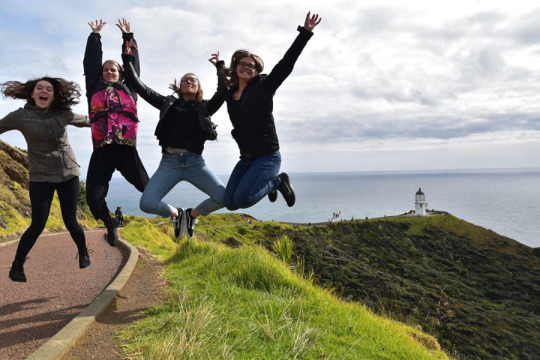
My friends from Denmark and Germany and I took a road trip together our second week — now, at the end of our semester, we are the closest of friends.
Preparing to study abroad can be a little overwhelming. You have to sign up for classes, pack your life into a suitcase and say lots of goodbyes. Checking everything off your to-do list can be incredibly stressful, so I thought I could give a little advice on how to handle it all.
Use social media for your study abroad research
The first thing I did upon being accepted to my study abroad program was research New Zealand. On top of reading a few web pages and blogs, I also integrated New Zealand into my social media. I followed several New Zealand Instagram accounts and Facebook pages to get myself excited for the trip. By the time I left for the semester, I already knew basic geography, Maori culture and most of the must-see sights — all from simply scrolling through my social media. It was an easy, enjoyable way to prepare for my semester.
Take a wide range of classes
One of the most stressful things for me was finding what classes I wanted to choose. I wanted my courses to apply to my major, but still be enjoyable. I encourage anyone who is considering studying abroad to take some fun electives while abroad. Of course, they should apply to your major, but you should also be open to taking cultural electives and new classes. While academics are incredibly important to your experience abroad, be sure not to overload yourself with coursework. It is important to balance and enjoy yourself.
Pack as light as you can
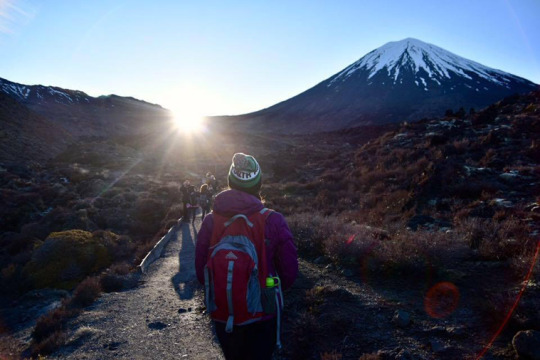
This backpack was one of the best things I packed for my semester. It has carried me through countless weekend trips and hikes.
My luggage was at the exact weight limit for the plane ride. If I could redo my packing, I would tell my past self to only bring my favorite clothes. In reality, you only need about half of what you pack (plus, you definitely are going to need space for some souvenirs on your way back). Bring a sturdy, big backpack for weekend trips and a compact carry-on for longer flights and trips. I used some packing lists online to base my checklist off of, and added more to the list as I thought was necessary.
Be excited to have friends from all over the world
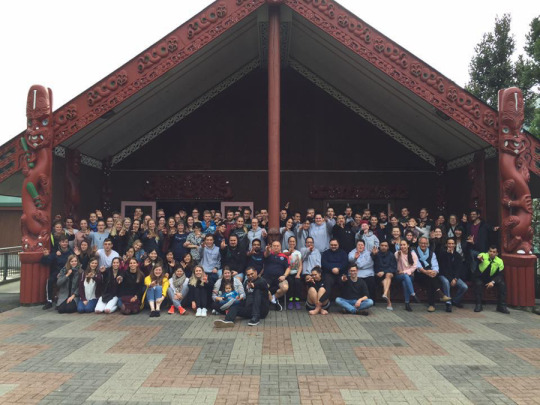
This photo is from the international Maori cultural weekend — this group of people comes from all over the world, and we have all become amazing friends.
On top of experiencing the culture of your study abroad country, be prepared to experience plenty of other cultures as well. This is something I didn’t really consider when coming abroad. Thinking about studying in New Zealand, I assumed many of my friends would be Kiwis. But as an international student, you often are interacting with other internationals. I can now say I have friends from Denmark, The Netherlands, Norway, Colombia and Germany, just to name a few. It’s incredible to be able to share all your cultures while exploring a country that is entirely new to all of you — these are the best friends for road trips and other adventures. Be open to experiencing things with a diverse set of people.
You’re not alone in feeling alone
Finally, one thing I think every study abroad student should prepare for is the initial emotional experience. While I’m not generally one to get homesick, I felt incredibly lonely for my first few days in Auckland. After almost 30 hours of traveling alone, it was a little sad to not find familiar faces waiting for me. It’s important to prepare yourself for that feeling, and to remind yourself that everyone feels alone at first. Two weeks later, I was going on a road trip with people who are now some of my closest friends – don’t feel discouraged the first week. Be prepared to feel a little alone, and use that opportunity to explore your new home for the next five months. My time in New Zealand has consisted of the greatest months of my life – when abroad, keep your optimism and remember to be open to new experiences. Happy travels!
3 notes
·
View notes
Text
A farewell trip across Europe
Story and Photos by Natalie Edelstein from Brussels, Belgium
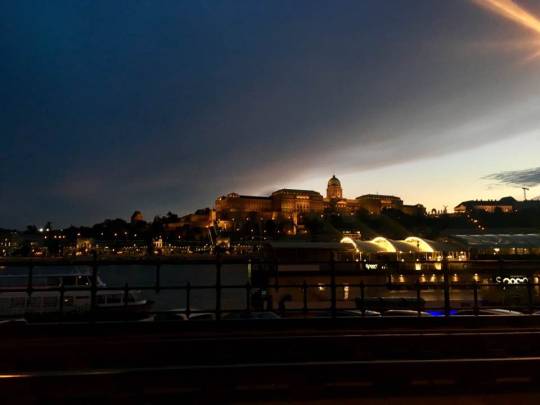
While most of my peers were packing their bags to return back to the United States, I was packing two weeks worth of clothes into my extra large, green REI backpack.
Prior to ever leaving the United States, I knew that studying abroad would be one of the best opportunities I had to travel. So when I booked my flights, I decided that even though my program ended on April 28th, I would stay until May 16th. I had a very rough idea of cities I wanted and how much money I could spend but other than that, I was pretty clueless when it came to backpacking and solo travel.
Finally, the day came for me to set off. As I said goodbye to my friends a weird wave of jealousy wash over me. No one really talks about how difficult being away from the United States can be sometimes. I missed my friends and family and Chick-Fil-A. Nonetheless, while they boarded their flights back home, I headed to the airport for my first stop Warsaw, Poland.
I flew out with my boyfriend at 9:00pm and we arrived at about 11:30. Our plan was to head straight to Krakow, however we missed the last bus so we ended up spending the night in the airport hotel. We woke up at the crack of dawn to catch the first bus to Krakow. After 7 hours on a bus we finally arrived at around 10am. Krakow is amazing for a few reasons. First and foremost, if you’re traveling on a budget it is dirt-cheap. We were able to get a nice dinner and a bottle of wine for about 10 USD. Krakow is also chalk full of history. The city isn’t particularly large so after spending about one day wandering around and heading to a few free museums (thank you EU student card!) we had a good feel for the city.
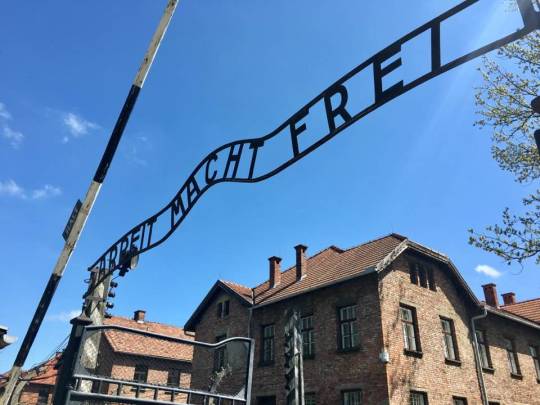
[Arbeit Macht Frei, “Work sets you free,” in German.]
On our second day, we took a day trip the Auschwitz-Birkanau, one of the most humbling experiences of our trip. We took a guided tour of both Auschwitz and Birkenau. There’s something truly chilling about walking through gas chambers and prison cells. For me, as a Jewish woman, I found the trip to be particularly meaningful, but I would recommend it to anyone in the area!
After a great 2 days in Krakow we took an overnight bus to Prague, Czech Republic. Before I talk about Prague, I must mention that the overnight buses are not for the faint of heart. I was wedged between my boyfriend and a stranger for over 5 hours and as you can imagine I slept very little. However, the bus ride was well worth it once we arrived in Prague. There is something truly magical about the city. The historic old town is incredibly well preserved, to the point where you almost feel like you are stepping onto a movie set! We stayed at a very cool hostel called Mosaic House, which I would highly recommend if you’re ever in the city. Like Krakow, Prague is also very cheap. We were able to have several nights out where beers cost about 1 USD. The highlight of the city for me was undoubtedly the Prague Castle. It is a bit of a hike to get to the top but the view is incredible. You can see every inch of the city, all while standing on some amazing grounds. There is even a preserved small town, which you can walk through and see what life was like for the groundskeepers and other people who lived and worked in the palace.
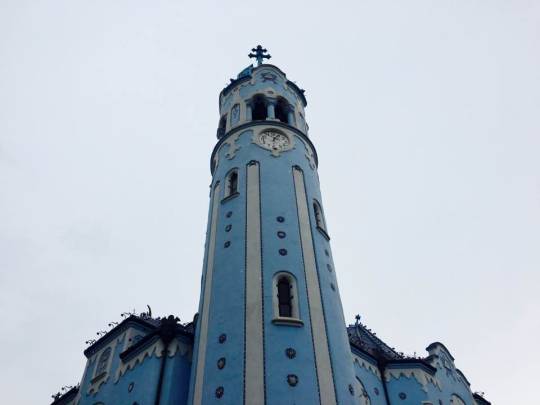
[The Church of St. Elizabeth, a.k.a Blue Church, is a Hungarian Secessionist Catholic church, located in the eastern part of the Old Town in Bratislava, now Slovakia.]
After Prague, we took a rather unconventional stop to Bratislava, Slovakia. While Bratislava might not be on the top of everyone’s radar, it certainly should be! Walking through the entire city only takes about 30 minutes but it is chalk full of history. We took a free walking tour that lasted about two and a half hours and we learned the history of a city that served as one of the main battlegrounds in World War One and Two.
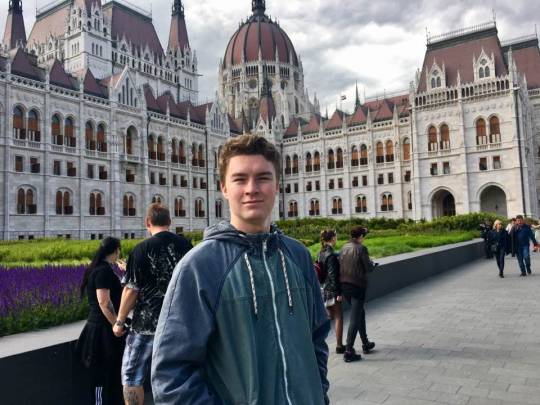
[Hungarian Parliament Building, Budapest]
Next we headed to Budapest, Hungary. There is a reason there are songs written about this incredible city! The minute we stepped off the metro, I felt as though I had been transported to a small borough of New York City. On every corner there is a trendy coffee shop or a new restaurant. Budapest, like the other cities, has a very interesting past, and on every corner there are museums and monuments that teach you about the revolutions and historical moments that occurred in the city. We were able to take a walk through the House of Terror, a museum dedicated to the history of the atrocities committed in Budapest during the Holocaust and Soviet-occupied times. Additionally, we visited several other memorials and parliament to get a good feel for the cities rich history.
For our second to last stop we flew to Thessaloniki, Greece. Thessaloniki is Greece’s second largest city and although sometimes it gets a bad rep for being boring, is definitely worth the visit. It is about $40-50 cheaper than many of the other Greek Islands and is a great starting point for a Greek adventure.
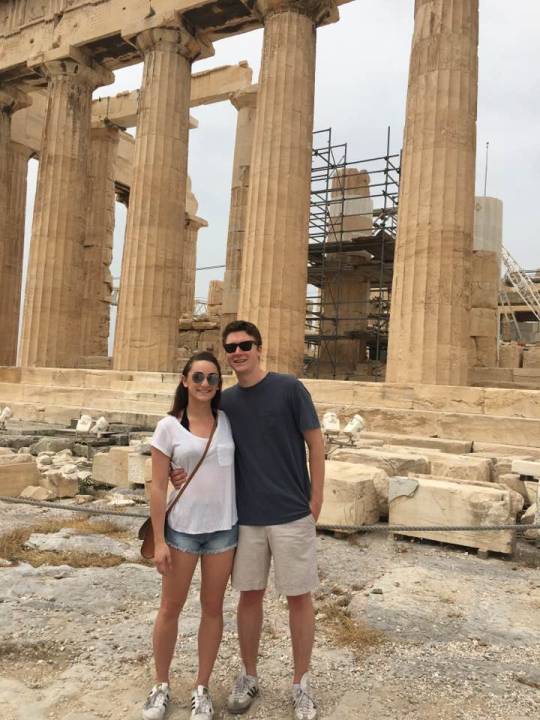
[Parthenon, Athens. It’s a temple dedicated to the goddess, Athena.]
For our final stop, we landed in Athens, Greece. Athens is incredible. It’s warm weather and kind locals make it an absolute must for any backpacking trip. Like many of the other cities we visited, Athens is the perfect mix of historical museums and culture spots as well as bustling nightlife and restaurants. You can get a delicious gyro or souvlaki for only 2 or 3 euro and the café culture is absolutely amazing. We took a trip down to Glyfada and enjoyed the Oceanside views for an evening, as well as the amazing seafood. The most memorable moment from our trip was the Aegean Sea cruise we went on, on our last day!

To anyone studying abroad: STAY AND TRAVEL. I am already itching for my next adventure and I am so lucky I had the opportunity to see the world in this way. Make sure you have a good backpacking backpack, as that will make all the difference. Investing in a few guidebooks is always a great idea, but we found that asking locals for advice always led to the best adventures. I am so sad my journey is over but I know I will cherish these moments for the rest of my life.
1 note
·
View note
Text
Fun Under The Rising Sun: Kyoto
Story and Photos by Taylor Banks from Japan
I thought that writing these blog posts would be easy, but given all of the new things that I experience in Japan daily, I realize that there is simply too much to write and too little time.
It’s fascinating that I would say “too little time” when I have been here since March, but it remains true. Japan may be only a little over half the size of my home state of Texas, but there is so much to see and do.
To think that this is coming from someone who has over four months to explore Japan! You guys probably won’t have much more than a week in Japan if you do decide to come visit, and so I figured that I’d save us both time and tell you about the places that I have been, and that you absolutely MUST SEE!
Let’s talk about Kyoto!
You have never truly seen Japan until you have seen the old capital of Kyoto. In places like Tokyo and Osaka, the architecture and scenery is so modernized that you can hardly tell that you are in Japan half of the time, but Kyoto simply has traditional Japan written all over it!
I only got to spend a little less than a day in Kyoto with my aunt, but I still managed to visit a lot of amazing sites!
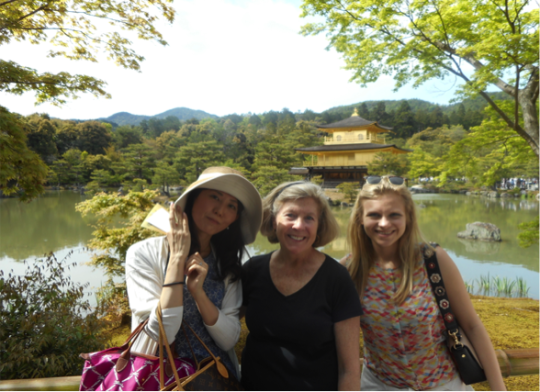
The Kinkaku-Ji (Golden Pavilion|金閣寺) or officially named Rokuon-Ji(Deer Garden|鹿苑寺) Temple is a holy place that holds relics of the Buddha. Its architecture reflects that of the Muromachi Period (1336-1573). Did I mention that the temple shines like gold? It is breathtakingly beautiful, and in 1994 it was registered as a World Cultural Heritage Site.
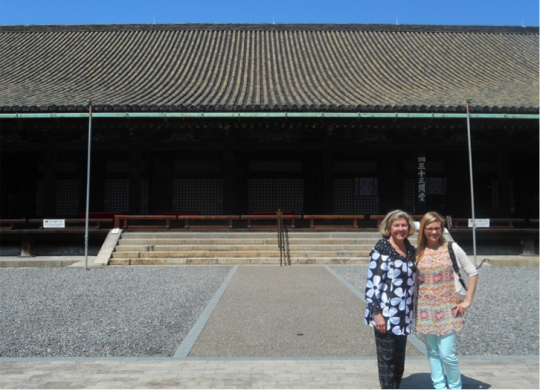
The Sanjusangen-do(三十三間堂) Temple or officially known as Rengeo-in Temple is registered as a National Treasure by the Japanese government, and anyone who has seen it could attest to why. For one, it has been standing unchanged for 700 years, and it would have been standing for a hundred or so longer had it not been lost in a fire.
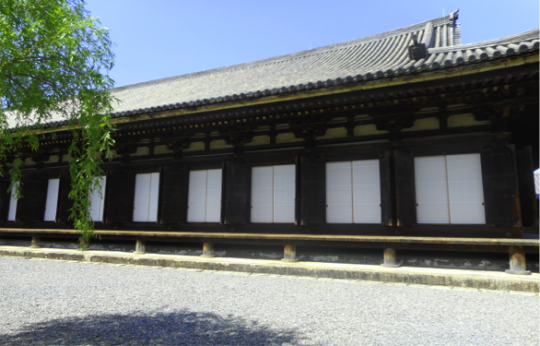
The second thing that makes this site so amazing is that it has 1,001 statues of the Buddhist deity, and every single statue is said to be a little different. Despite the fact that the newest statues inside of the temple were made in the 13th century, the figures look brand new and incredibly realistic. The stares of the guardian deities as you walk through are convincing enough that it may send a shiver of fear down your spine.
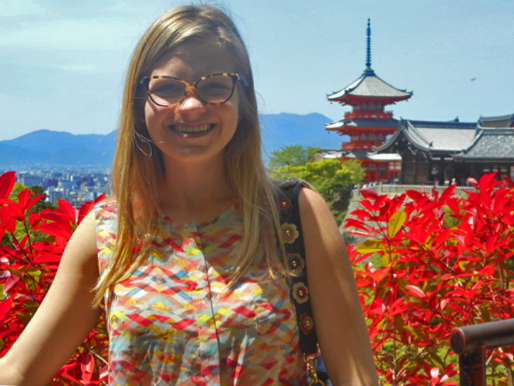
The Kiyomizu-dera(清水寺) Temple (The Pure Water Temple) is easily the largest and most impressive temple that I have seen in Japan so far! It is a signature World Heritage Site in Kyoto, and it has a history dating back more than 1,200 years! If you see nothing else in Kyoto, you MUST see this temple!
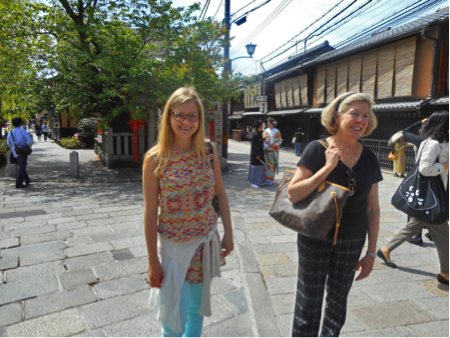
The Geisha Quarters! It’s pretty much self-explanatory isn’t it? There are four Geisha Districts in Kyoto. I got to take pictures around the area, and it looks like I wasn’t the only one. Several Japanese couples took wedding pictures there in kimonos. The traditional garb definitely matched the traditional scenery in Kyoto!
#kyoto#kiyomizudera#geishadistrict#japan#travel#sanjusangendo#rengeointemple#kinkaku-ji#rokuonji#studyabroad
0 notes
Text
Tips for traveling in Europe
Story and photos by Madeleine Sutherland from Edinburgh, Scotland
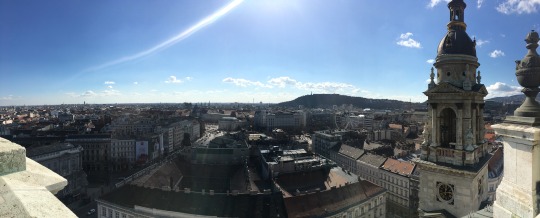
[Budapest, Hungary]
When I began my trip abroad, I told everyone how much I was going to travel. It seemed like dreaming big at first but now, twelve countries later, I've got a big warehouse of knowledge in my mind I want to share because hey, I did it! I traveled! The problem with traveling a lot is that it puts a thirst in you that's unquenchable. Where to next? I think Australia, probably.
Below is my list of general tips for traveling Europe on a budget.
Hostels
Hostelworld.com: This website gives the best ratings and honest reviews. Any accredited, legit hostel will be on this website.
I usually go for ones with about an 8.4 rating or above. This may sound like a random number, but I've found it's kind of the sweet spot.
Check if your hostel has towels, linens, lockers and locks available before you stay there. Usually, hostels will charge for locks and towels but linens and lockers will be provided.
Airbnb
Airbnb can be a great option when you are traveling with one to three other people! The hosts are usually super kind and will give you tips on how to see sites and get around. Many of my trips were made great by the amazing hospitality I received from Airbnb hosts. The site is also super easy to book on and reviews can be trusted.
The best Airbnb I ever stayed at was in Zürich with Allan and Yvonne. If you plan to go there, look them up! Their home was so welcoming and comfortable and they are the cutest, kindest people. (Allan was a Cards fan, so I knew right away we were in good hands)
Transportation
Public transit is no joke in Europe! Most of the time it is cheap and easy to find and understand. Why the U.S. has not caught up with this does not make sense to me.
Ryanair and easyJet will become your best friends because they are usually the cheapest airlines that do the most flights throughout Europe. Ryanair flights are almost always delayed and easyJet only allows one carry-on bag. They kind of suck, but they get you where you need to go.
Take metros and buses from airports whenever possible, especially in Paris, Prague, Munich, Amsterdam, and Barcelona.
Take trains from cities that are close together. It will cost SO MUCH LESS than flying, and train rides through the country are often very beautiful.
Most city public transit systems are based on trust, especially if it's a metro train without a ticket gate or a tram. I would advise to always validate your tickets or else risk an embarrassing public transit citation, which can get expensive.
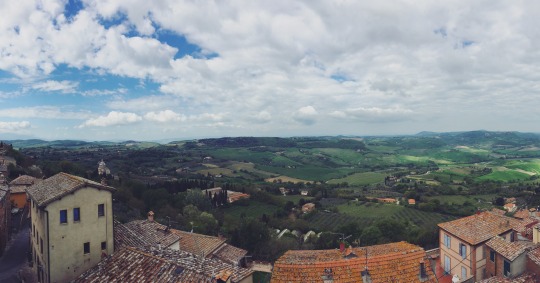
[Montepulciano, Tuscany, Italy]
Food and drink
Do not tip in Europe. You are on a budget, and most places expect nothing as a tip. So don't feel bad if you don't! Unless you receive extra-great service, leave it. Most places add a service charge into the bill anyway.
There is no such thing as splitting bills beforehand in Europe. If eating with a group, you will each have to count up how much you spent after the bill comes. Sometimes you can pay certain amounts on card machines, but in many cases, they will only accept either one card or all cash.
That's another thing, always have cash with you. You will end up spending it one way or another.
Don't be surprised if you don't get served right away or if they don't bring you the bill right after you finish your meal. You have to ask for the bill when you want it. Waiters in Europe like to take their sweet time and consider it rude to try to rush you out after eating. Flag down the waiter when you need the bill or tell them in advance if you're in a rush.
If a waiter puts water or bread on your table in a non-U.K. country without you asking them to do so, they are trying to get you to eat/drink it so they can charge you for it. And most times, that innocent-looking bread basket on the table will cost about 8 Euro.
Running off of that, there is no such thing as free water in mainland Europe. Drill that into your head and buy yourself a reusable water bottle. Tap water is all fine to drink in Europe but they won't serve it to you because they want to charge you every chance they get. Take your own water into restaurants in a bag or pocket. (Scotland and Ireland, however, do have free tap water on request. Go Scoty!!)
The drinking age pretty much everywhere is 18. Try new beers and wines and forget about that disgusting Natty Light you've been drinking.
Safety
People who do the following things are trying to get money from you:
Accepting a flower or trinket at a touristy site.
Getting unwanted help using metro ticket machines.
Getting handed free metro tickets.
Getting un-asked-for directions.
Language
Try to learn a little of the language everywhere you go! It will go a long way, especially in Italy, Spain, France and Germany. And it's fun!
Most countries will have things in English. I found that Germany, Austria and Italy really didn't, however. Be ready to Google translate some things.
Being American
For some reason, every U.S. citizen abroad has one thing in common: We kick ourselves for being American when we meet people from other countries. I'm not sure why, perhaps it's the fear of being seen as stupid or ignorant because of our citizenship. My biggest piece of advice is this: If you act like a dumb American, you will be called a dumb American. If you act like a normal, kind human being, then no one will bring up where you're from. There's no need to feel bad about being American. Just try not to be that person who is extra loud or a know-it-all. Every European and Australian I've met has a good view of Americans as people.
Planning
This is especially true in Rome. Book literally everything in Rome beforehand. The lines are so long you will feel sick just looking at them. Don't be the bum that stands in line for three hours to see the Sistine Chapel.
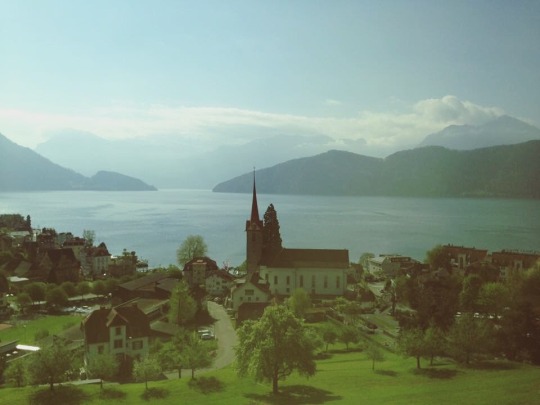
[Lake Lucerne, Switzerland]
Other important things
Be a positive, problem-solving traveler. Keeping a good attitude sounds so basic, yet it's the absolute key to enjoying each trip you take and making sure you don't annoy the crap out of the people you travel with. Complaining gets old SO FAST. Focus on positive things. When you mess up, realize it is normal to do so and that things will work out. Be patient. Be the one to say something good instead of the one to point out every bad thing. You will get tired, hungry, thirsty and your feet will hurt. Complaining won't change those things, it'll just piss off your group.
Wear good shoes and be prepared to trash them. I have three pairs of shoes I've completely torn to shreds on this trip because of all the walking. Do not skimp on good shoes!!! To give you an idea, the main shoes I've worn are my tennies, a pair of black, waterproof Timberlands and a cognac pair of leather Kork-Ease booties. Everyone wears boots in Europe in the spring, fall and winter. You will not regret splurging on a couple nice pairs before your trip. I've heard American Shoe in Columbia sells some really great stuff. Wink, wink, nudge, nudge.
Coats go along with this! Since I lived in Scotland, I needed three different weights of coat. I had a large winter one, a thicker rain jacket and a light rain jacket. I have used all three.
Please drink water. Drink so much water you want to throw up. Okay, not really. But stay hydrated. Get that water bottle.
If you see a bathroom, use it. This is one of the most key things I could ever say. In huge cities like Rome and Paris, there is no such thing as a public restroom.
Get yourself a portable battery. You will use it, I promise!
If you are going to be based in one country in Europe for any long amount of time, consider getting a SIM card from your home country. I found a carrier in Scotland that, by getting a SIM card from them, provided me with 13G of international data for only 20 pounds a month. That data saved me on a lot of my trips. (Sorry mom and dad. I'm only so good at reading real maps)
Download the Google Photos application. It automatically puts any photo you take on your phone onto the application so you won't have to worry about storage for photos as you travel.
Download the XE application to get current exchange rates for any country.
Put your phone/computer in military time. Most if not all travel times and ticket times are listed in military time in Europe.
Try to learn European measurements, including temperature. It will take time, but is a valuable life skill to have.
Lastly, just try to take everything in as best you can. Each travel experience is different, and mine is probably much different from what yours will turn out to be. It's Europe! So have a blast and make as many friends as you can. I promise you, your heart can hold so much more love for human kind than you ever thought possible.
#europe#travel#travelabroad#studyAbroad#mizzou#edinburgh#scotland#Hostel#airbnb#MUJA#switzerland#tuscany#Italy#lake lucerne#budapest
1 note
·
View note
Text
Foodie life in Europe
Story and photos by Natalie Edelstein from Brussels, Belgium
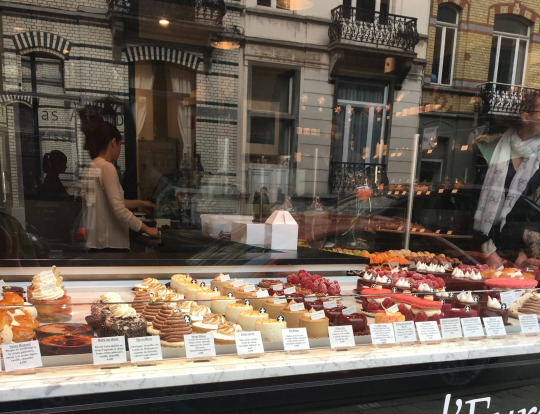
[A bakery in Brussels, Belgium]
Back in Columbia, it was not uncommon for me to leave the J-school after a long evening of working and head straight to Hyvee to pickup ingredients for that night’s dinner. It was comforting knowing that whether I arrived at 7:30pm or 11:30pm the massive produce section and the smell of HyChi would always be there to greet me. However, when I got to Belgium, the luxury of late night grocery runs was gone. From store hours to the drinking age, there are several major differences between mealtime in Europe and in the States.
I consider myself somewhat of a foodie and eating my way through Europe has been both a learning experience and a dream come true. From drinking Kolsch and eating brisket in Cologne to navigating Escargot in Paris I’ve picked up on some of the subtleties that differentiate a European meal from and American one.
1. Cheese & Bread

[Tapas in Alicante, Spain]
Once, our program director, Gareth Harding, said when he is visiting Columbia he loves to peruse the dairy aisles of the grocery stores so he can snap pictures of “what we’re passing off as cheese in the United States.” His friends always get a kick out of the photos. Europeans take their bread and cheese seriously. On every corner you can find a bakery with delicious pastries and fresh baked baguettes. At every meal, regardless of the time of day, you can expect a basket of bread at your table. We’re not talking Olive Garden baked yesterday bread either, we’re talking rolls that are still warm and so delicious they could be a meal by themselves.
2. Drinking
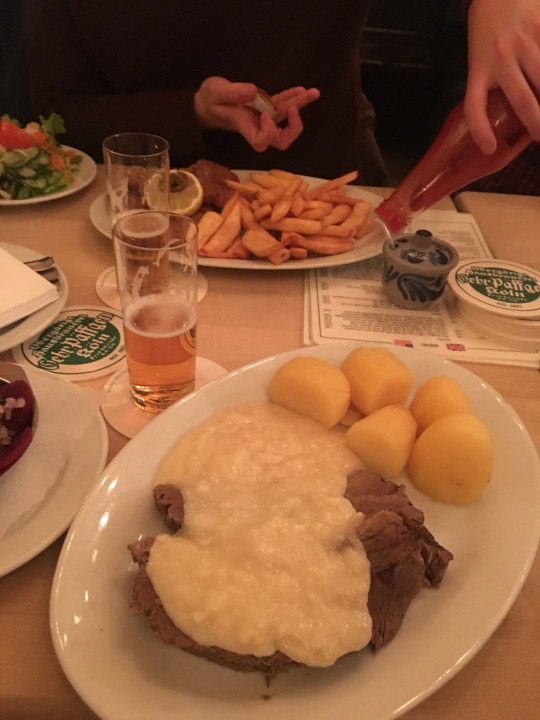
[Brisket and Boiled Potatoes from Max Stark in Cologne, Germany]
Obviously, a major difference at mealtime is alcohol consumption. The legal drinking age in most areas of Europe is 18, so Europeans grow up drinking more in casual settings than Americans do. Additionally, on average Europeans drink more wine and stronger beers than Americans. It’s not uncommon to find beers in Belgium that are 10% alcohol or more. Another odd drink difference, in many restaurants your drink won’t come with ice and much to my dismay iced coffee in the morning does not exist.
3. Condiments
Europeans, especially Belgians, put mayonnaise on everything. At almost every restaurant I’ve been to mayonnaise is offered as a side for whatever you’ve ordered. One of Belgium’s most famous delicacies, frites, is frequently served with a hearty dollop of mayonnaise right on top. But if mayo isn’t your thing (like me) you can try one of the 27 other sauces offered at most of the frite shops around Belgium. Andalouse and Samurai sauce are also very popular and pair perfectly with frites!
4. Mealtimes and Operating Hours
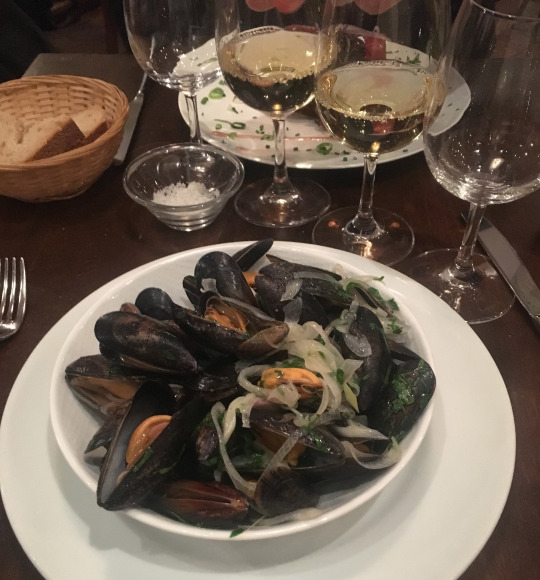
[Mussels from Volle Gas in Brussels, Belgium]
It’s nearly impossible to find a grocery store that is open in Brussels after 9pm. The days of late night grocery runs are far behind me. It is also not uncommon for restaurants and stores to be completely closed on Sunday’s, so meal planning has to be done earlier in the week. As for meal times, dinner is usually much later than the American tradition of 5:30/6:00pm. In addition to the later times, Europeans spend much more time at their meals. Lunch can last anywhere around 3 hours and dinner can go for even longer.
5. Fast Food/Snack Shops
Yes, you can find McDonald’s in every major city, but the rate in which Americans consume fast food is much higher than anywhere else in Europe. There are snack shops in most of the cities and although they don’t have the variety that McDonald’s or Taco Bell might offer, they have about the same wait time as a fast food joint and the ingredients tend to be much fresher. 24-hour eating is much harder to come by in Brussels but in the big cities like London and Berlin you’ll always have somewhere to go for your 3am burger fix.
0 notes
Text
7 Things That Surprised me About Japan
Story by Taylor Banks from Waseda University, Tokyo, Japan
Despite having studied Japanese culture and language for around three years, the MU journalism abroad program through Waseda has been my first opportunity to see Japanese life firsthand. Here are the 7 things that surprised me the most—in no particular order—about life in Japan.
1. The slippers:

I have always known that it is a Japanese custom to take off your shoes before entering a home. However, I was not aware of the fact that you also must change into a pair of slippers before entering. I didn’t know that this also applied to dorms and even some restaurants.
Upon entering the bathroom in the dorm, you must change out of those slippers and put on a pair of rubber sandals. You change back into the slippers just before you leave the bathroom. However, it is uncommon for the Japanese to wear shower shoes in the shower. Note that the toilets and the showers are in separate, unconnected rooms.
In traditional Japanese restaurants, you are expected to take off your shoes before entering a booth. If you leave the designated eating area, they may actually give you another pair of slippers to use just to walk through the hallway.
2. The swastikas:

In Japan, you will occasionally see swastikas on merchandise, maps, and temples. This is because in Japan, the swastika is a symbol for Buddhist temples. The use of the swastika in Buddhism predates WWII and has existed since antiquity. It in NO way refers to Nazi Germany or the genocide of Jewish people.
As a Westerner, I jump out of my skin a little everytime I come across a swastika. In fact, I cannot think of a more offensive symbol by American standards. However, it is important to acknowledge that the swastika means something different here and does not carry the negative stigma that it carries in the West. The Japanese are not Nazis.
3. Most people in Japan rely solely on public transportation:
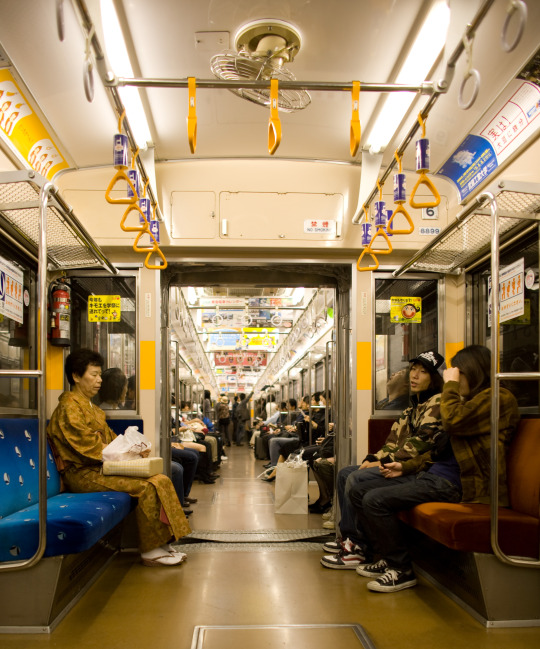
If you live in Japan, you’ll discover very quickly that the majority of Japanese people do not own a car and many don’t even have a driver’s license. There are car services and taxis, but they are very expensive. As a result, almost everybody travels by train. In fact, it seems that the closer you are to a station, the more shops, restaurants, and people that you see.
The trains are very reliable and stop EXACTLY as scheduled unless there is a delay of some kind. They can be very crowded, and they wait for no one.
The various different rail lines never cease to confuse me, and on many occasions, I would have been screwed if I didn't know how to ask where to go in Japanese.
4. The Shower Room:
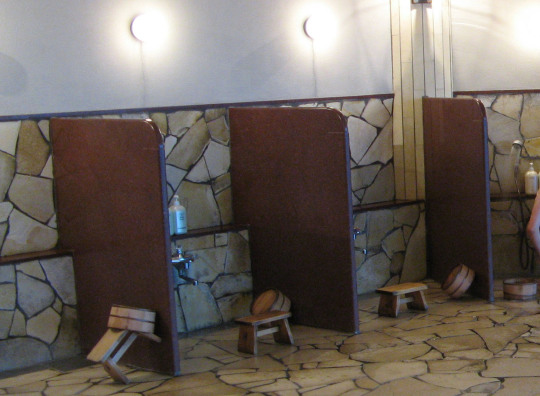
The dorm shower is community style. I was surprised to find that only 3 of the shower stalls were private. The other showers are faucets lined across the wall by a small mirror hung at thigh level. The positioning confused me until I saw girls taking the plastic stools from the corner of the room and using them as chairs while they faced the mirror and washed themselves.
I assumed that the private showers would always be the first ones to be taken, but I was shocked by the fact that most of the girls from Japan and other parts of Asia—which is almost everybody— consistently chose the public showers over the private ones.
I have been aware of the sauna and onsen culture in Japan for some time now, but whenever I see a large group of girls congregating together naked in the same bath tub chatting it up, it triggers my culture shock.
Keep in mind that most of these girls just met in March, and they are all comfortable with being naked together like that, nobody feels self-conscious about their bodies, and nobody sees it as homoerotic in any shape or form. Never in a million years would that happen in the U.S.
5. The Japanese REALLY love America:
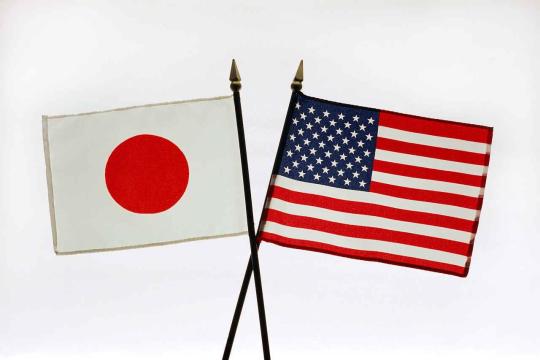
Despite the rocky history that the U.S. has had with Japan so far, it is obvious upon going to Japan that the majority of Japanese harbor no hard feelings against the U.S. and to the contrary, most likely love America more than a lot of Americans do.
On any given day in Japan, you will see people of all ages wearing clothing or accessories with American flags, city names, flags, sports teams, colleges, and many even flat out have U.S.A written on it.
It is incredibly common, and that is before you take into account the obsession with Disney and The Peanuts cartoons. It is crazy to think that you can find way more Disney and Peanuts merchandise in Japan than you could ever find in the U.S. It is everywhere!
Before I came to Japan, I struggled to find things to bring as souvenirs that would come off as American, but in Japan, I see a lot more merchandise with stars and stripes than I did in the U.S.
They also are obsessed with baseball! On any given day in Tokorozawa—where I live—there are posters of the Saitama Seibu Lions team lining the streets. Not to mention, they play the lion’s team song on the loudspeaker throughout town practically all day every day.
The Japanese also play American music often, and I found several teenagers who are obsessed with Kanye West.
I have faced absolutely NO hostility for being American in Japan, and to my surprise, a Japanese college student told me straight up that he thought that America was, “the greatest nation in the world.”
6. The food:

The restaurants usually have large portions for prices that are cheaper than most restaurants in the U.S. However, the grocery store is a different story. There are not a lot of choices at the store, especially not of dairy products or meat, but you can get some of the weirdest seafood ever.
Also, it is not unusual to have a full-bodied fish with eyes, fins, and everything else looking at you at the dinner table. They also like to keep all of the legs and the head on the shrimp.
I’ve heard stories about people eating shrimp and fish while they are still alive too, but I’ve never seen it.
I think the weirdest thing that I’ve seen so far was at a tofu restaurant in Kyoto. There was a pot of soy milk—they have practically no real dairy here—sitting in the center of the table on a heat plate. It was divided into three sections. My first thought was that it would harden into tofu blocks. That wasn't the case, though. The sole purpose of the pot was to heat the milk so that the strange film forms at the top. I thought that they were just removing the film before eating—like I usually do when I make hot chocolate—but they were actually removing the milk film to dip it in soy sauce and eat it. Upon witnessing it, I burst out into laughter. To me, it is like grilling chicken just for the sake of eating the char marks afterward. I couldn’t believe it!
7. The lines between what is age appropriate seem blurred and non-existent:
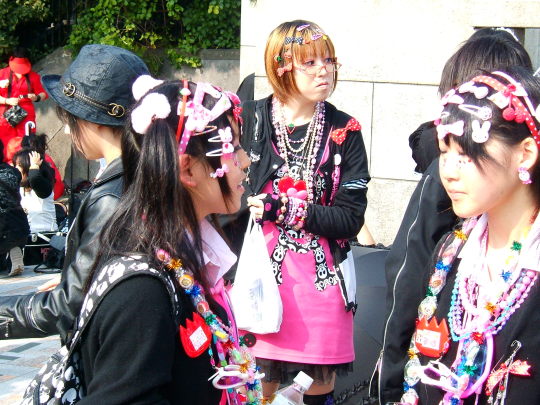
In the West, there comes a point where culturally you are supposed to dress a certain way in order to avoid looking childish. Older people are also expected to act a certain way, and when they are caught doing something that some might deem as childish, they are embarrassed. In Japan, it doesn’t seem like there is such a cultural expectation based on age.
For example, adult women occasionally dress like little girls in an attempt to be cute. The frilly doll-like dresses are sold in a lot of places, but it is rare to actually see them worn. Some women will stand outside in frilly maid costumes to attract male customers. They don’t appear sexy from a Western perspective, but I believe that older Japanese men may beg to differ.
Adult men will occasionally wear clothing with Disney characters or Star Wars characters that look like it was bought from the kid’s section at the store.
If you go to an arcade, the majority of people there are actually adults many of which appear to be in their 50s. They like to smoke a cigarette and play the games while wearing a suit. It is truly a bizarre sight.
Even the old businessmen in suits can be caught playing Pokemon on a DS or with a stuffed Disney keychain hanging from their briefcase.
It is also expensive to live alone, so a lot of adults in their late 20s and 30s remain unmarried and living with their parents.
In the U.S. we have a culture where the second guys hit college, they are encouraged to become frat boy stereotypes that playfully compete with each other by how much they can drink or how many girls they can sleep with. That doesn’t exist in Japan. It seems that Japanese boys often are too shy to adopt that mentality. Most of them do smoke cigarettes though.
In America, it is mostly older people that smoke cigarettes, but in Japan it is everyone. To see so many young men and women smoking is jarring in my opinion. Not to mention, you could do it in any restaurant here! They occasionally limit it to smoking sections or rooms, but you still usually smell it.
I hope that you learned something new from this post. I will continue to keep you posted. As we say in Japan, またね!See you later!
1 note
·
View note
Text
The second plucking
Story and photos by Madeleine Sutherland from Edinburgh, Scotland
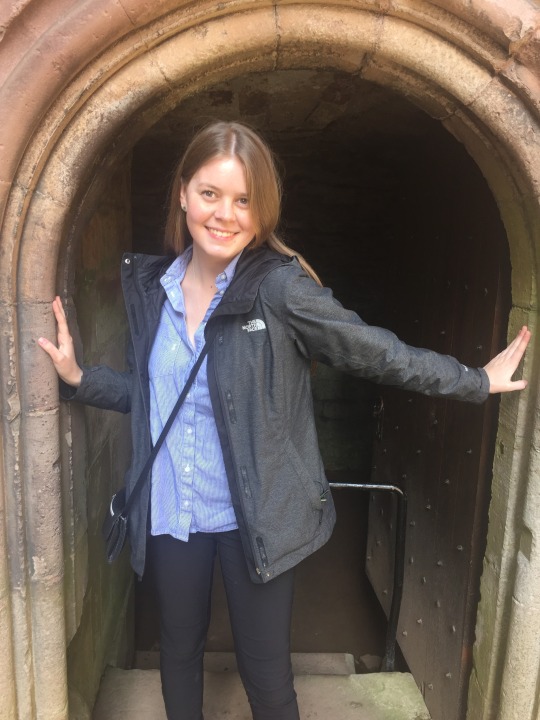
“It’s me looking really happy at Melrose Abbey in southern Scotland. Scotland is sunny sometimes, believe it or not!”
It's been a little bit since I've written. Things have been slowing down. I've still been traveling around, of course, continuing to hang with friends and eating great food. But this weird thing has happened:
It's gotten normal.
They told us this would happen before we left for study abroad exchange. Things begin to become normalized and what never lined up before in your mind, like where the heck you were when you first got here, suddenly finds meaning. It's like when Einstein created the Theory of Relativity--everything that before was a great big mess now becomes a great big monologue.
I feel like when I return home I'll get used to saying the same script:
Yes, I loved it there. Yes, I met so many friends. Yes, it really did rain a lot. Yes, school was fine.
This brings me to wonder, when I leave here is it my duty to write a short story titled "My Time in Scotland" or do I create a collection of poetry about Edinburgh, the countryside or macaroni and cheese? Will my experiences become that mundane that I'll be able to boil them down into a 500-word narrative? Will I get tired of explaining and lock them all away?
This is cynical, I know, but these are the type of things I've thought about now that my experience living in the United Kingdom is nearing its end.
From the beginning, I've described it to my family as being plucked out of one life and plopped down in another. I have about one and a half months left here in Scotland. So, as it's now spring and the flowers are blooming, I'm gearing up for the second plucking.

“I sang my first ever open mic in Scotland. Here I am with my friend Ryan singing Johnny Cash’s ‘Ring of Fire’ with one of my exchange friends, Ryan who is from Connecticut.”
The thing that's been striking me lately is how my vision of spending four months in Scotland has differed from what I've actually experienced. Furthermore, what I've actually experienced has differed quite a bit from what I can now recall I experienced. My brain grasps onto bits and pieces of each place I've gone, each person I've met. It doesn't, however, remember everything. In twenty years, will my brain be able to do anything other than retell a story that's been shaved down into a sparkling but vague trophy of studying abroad? I usually detest hypothetical questions, but as of now I've got nothing left to say what I mean.
This is the other side of spending a lot of time alone, a lot of time across the world from the home that's deeply scorched onto your heart. This is the fear part. This is the change part. And I have changed, just like they said I would.
I've talked about it before. At the beginning of the trip, it was superficial change. I'm getting more sleep, I'm less stressed, stupid things don't bother me, etc. My pen has returned to paper; I've been writing again just for the heck of it. I've become okay with being by myself for long, long periods of time. I have the courage to make friends with strangers. I'm okay with navigating a huge city I've never been in before.
And there are the big changes, too, the ones that are hard to describe in writing. Those are the successes. Those are the lessons. And those outlive any story I can write or recall.
I think maybe it's good for all of us — whether we've never traveled outside our state or whether we've been to all seven continents — to examine our life experiences and question how much we have really tried to live in the moment. Being in another country for four months, you say to yourself that you're going to take everything in, but it never works quite that well. Technology and other distractions take away from what we see, hear and touch.
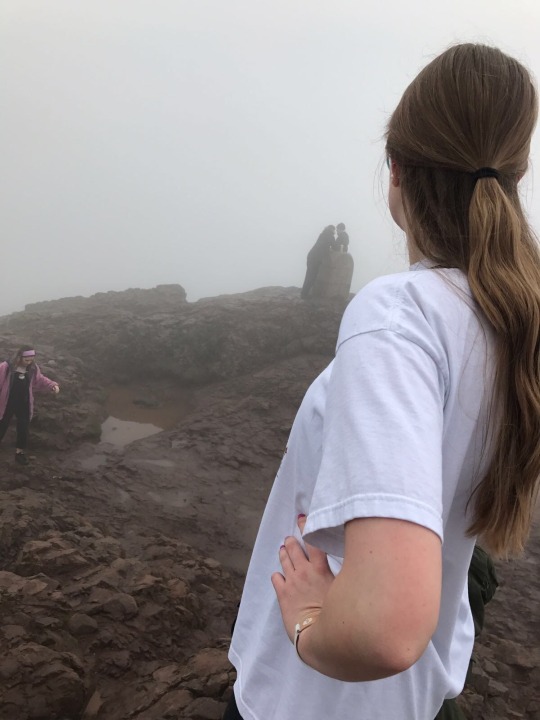
“I am standing on top of Arthur’s Seat, a large hill in Edinburgh, after hiking it on a misty day.”
On another note, I feel like as an American, I am used to taking things for granted. My experience here in Edinburgh has been for fun, for learning. But other people are forced to be plucked from old lives and popped into new ones for other reasons: hunger, panic, revolt, environmental damage, persecution, healthcare, etc. What I have experienced here in Scotland is a privilege. I got to change for fun. The sights and sounds and memories of people I will take with me will be positive ones. And I'll get to return to my old life like nothing happened, with a head full of good times and a couple sheets of summary. Some people will never get to return. And I think it's important to consider that as I round out my trip.
With family soon to visit and a two-week-long tour de Europe coming up, I've still got plenty to add to my story, and plenty of time to work on not taking things for granted.
This is my reminder to myself that everything is limited. Things go on. I will continue to change after this trip, and the world I leave in Scotland will continue to turn as if I never touched down there. I need to wake up and smell the roses before I get plucked once again and placed back in the pile of pale Missouri daffodils. I'm going make my story here as detailed as possible before its inevitable conclusion.
Wow. Flowers as a metaphor for the ephemeral nature of life experiences--can't you tell I'm feeling creative today?
#scotland#edinburgh#edinburgh napier university#MUJA#studyabroad#united kingdom#arthur's seat#melrose abbey
1 note
·
View note
Text
Hostel Life
Story and photos by Natalie Edelstein from Brussels, Belgium
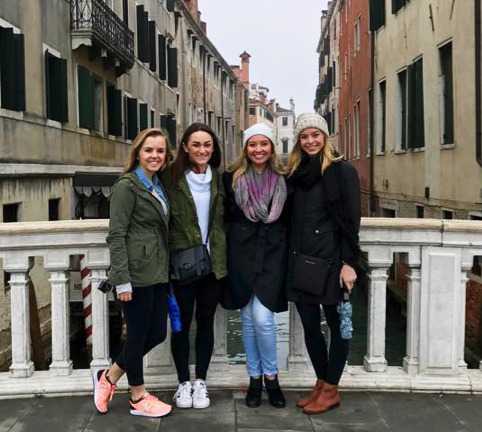
[Natalie with her friends in Venice, Italy]
Before I departed for Europe, I purchased a book titled, Europe on a Shoestring: Big Trips on Small Budgets (If you’re studying abroad, I highly recommend this book). I remember thumbing through the pages and seeing that in every city they recommend you stay at a hostel. Now, I’ve done my fair share of traveling in the US but I’ve always opted for a hotel or an Airbnb, so the idea of a hostel kind of freaked me out.
There are hundreds of options to choose from each ranging in price and privacy. You can spend a little more for your very own room or you can spend as little as 7 euros, for one bed in a big dorm.
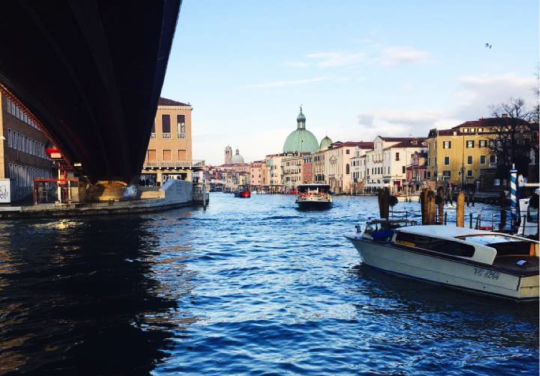
When I arrived at my first hostel in Venice, Italy, I didn’t really know what to expect. Four friends and me had booked four beds in a female room that housed 10 other people. Was it going to be gross? Was my stuff safe? It certainly didn’t look like much when we arrived at the front door. I had lots of questions running through my head, then we stepped through the door. When I say this place was cool, I really mean it. The décor was classy and modern, there was a restaurant to my right and a bar to my right and the place was full of young travelers from all over the world. I was honestly shocked that I was paying only $20 a night for all of this.

[Lobby of the hostel where she stayed in Venice]
When we got to our rooms we found that the beds were bigger than the ones in our apartments back in Brussels and that each of us had our own outlet and storage locker. We were staying in the same room as girls from Australia and Korea and we swapped travel plans and stories. When we went down to the lobby there was a DJ playing music and fun, “club-like” lights. We met even more people from Canada, Portugal and the United States. Within minutes we had made plans with our new friends to go out that night.
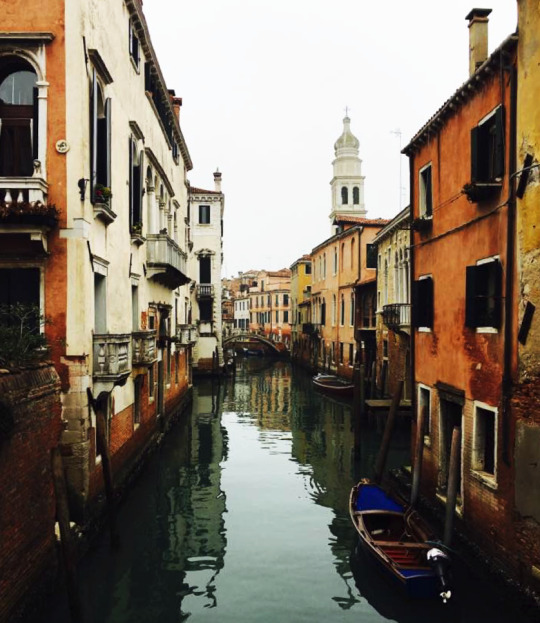
While Venice was absolutely one of the most beautiful cities I have ever visited, our experience in the hostel is what will stick with me forever. Looking ahead, we have trips planned for Amsterdam, Berlin, London and Morocco and you best believe we’ll be staying in hostels for everyone.
0 notes
Text
Two weeks in Edinburgh have flown by
Story and photo by Madeleine Sutherland from Edinburgh, Scotland

From the moment I arrived at the airport in Edinburgh, I felt as though I had been picked up by some great guiding hand and plopped down in a new place. Scratch that, a new life.
Edinburgh appeared murky. I had been warned about the ever-grey skies and the mist and the constant melancholia that surrounds great Gothic cities like this one.
But it's not melancholy at all; it's a city full of life, which I learned quickly. Must be because it rains so much.
Allow me to cover the basics:
My accommodation is clean, modern, homey and located in the west-central part of the city. I'm a (brisk) 15-minute walk from the city centre and only a 10-minute walk from Grassmarket (a square full of cozy shops, including the best second-hand shop of all time) and a great Irish pub called Finnegan's Wake.
I hang with people from all over the world. Napier is full of international students, whether they be on exchange like me or full-time students. My roommates are from Germany, Canada, America and Hong Kong, to give you an idea.
I have lots of free time. This free time has allowed me to relax for the first time in a while. I have finished a whole book, a website and written some things since being here.
The food amazing, but take that with a grain of salt. Because I am in Edinburgh, the food is very "city," meaning that it's not quite authentic. You can get fish and chips and haggis for sure, but the real Scottish food lies outside of Edinburgh and north, in the Highlands, waiting for me to try it. Stay tuned.
The accent varies. Sometimes it's not an accent, it's another language. (More on this after I visit Glasgow this weekend.)
The beer is better here and the whiskey is good as well, if you like whiskey. I, however, have discovered that whiskey and my throat are not good friends. I shall stick with my Bloody Mary, thank you.
"Uni" is structured much differently here; it's mainly independent study. There are a few, and I mean few, required readings for each class, and then a ton of suggested readings. The professors tell you to read only what you're interested in--a revolutionary concept! They expect two groundbreaking essays during the term: one due in the middle of the semester and one at the end. Those two assessments are all you're graded on. And they don't give high marks. A 60% or above is considered an excellent grade. Below 40% is failing.
The birds only sing at night. That might not be an actual factual fact, but the only time I have heard the chirping of birds is around 8 p.m. It's eerie and totally, completely the way it should be.

There are many wonderful and different things about Edinburgh, and frustratingly a lot of them are kind of hard to put into adequate words. The weather is cool but not cold. The rain is constant, yet it seldom touches your head. Life resides above me in the clouds and around me on the busy streets. I have never felt safer in a city. The people are almost Midwestern, they're so kind. The greatest overarching theme is that I can breathe. My eyes are open to new things, but also to old ones that I haven't seen for a while because I've been so busy achieving, pushing forward, always going ahead. Life is lived at a different pace here, and I am learning to live with it.
Some great friends and Erasmus buddies have made the transition into this new life pretty easy. It's been better than I ever could have expected, and I've only been here for two weeks. What's to come, I hope, will be even better.
My friends and I are going out to sing karaoke tomorrow night, at which time I will bless Edinburgh with a glorious rendition of a Fleetwood Mac song. They love the '80s here. Also, do yourself a favor and look up what a Scottish Ceilidh is. I'm going to one next week on Burns's night.
This post is a general one, but from here on out I'll give more specific accounts of things in Edi and in cities that I visit abroad. I have many trips planned! Get ready to hear about Glasgow, Dublin, Isle of Skye, Inverness, Stirling, Amsterdam, Brussels, Prague, Vienna, London, Dunrobin, Marseilles, Montpelier, Barcelona, Rome, Zurich, Geneva, Lyon, Frankfurt, Hanover, Copenhagen and Stockholm.
Think I'm biting off more than I can chew? We'll find out. All I know is I have flights to book, coffee to drink and 35 chapters of "Tess of the d'Urbervilles" to read for next week.
1 note
·
View note
Text
Nothing but Good Days
Story and Photos by Natalie Edelstein from Brussels, Belgium
I don’t have much to say about my trip from Los Angeles, California to Brussels, Belgium. This is probably because I fell asleep before my flight ever took off from LAX and when I woke up, 11 hours later, I was in Dublin. Surprisingly, I even slept on the two-hour flight between Dublin in Brussels.
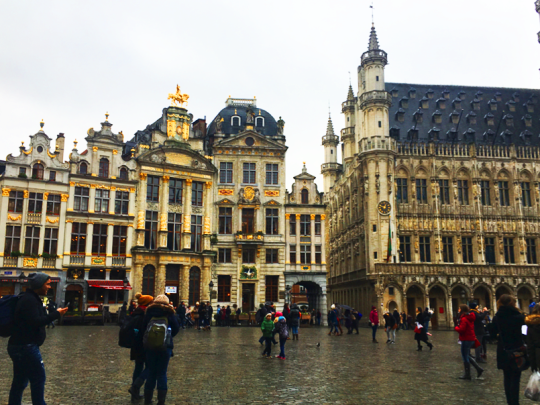
[Brussels, Belgium]
I’ve now been in Belgium for 3 weeks, and I have plenty to say about that. What an insane adventure it has been. You can read all the guidebooks you want, take as many virtual tours on Google maps as your heart desires, but nothing will truly prepare you for the first time you try to order coffee and the barista responds to you in French. Although it has only been three weeks, I can already confidently say that living abroad is an experience like no other.
I’m currently an intern for FleishmanHillard EU and even in my office full of ex-pats there are some European customs that took some adjusting to. Primarily, the work culture in Europe is much more relaxed than it is in the states. The daily attire also consists of much more black, blue, and gray than I’m used too.
Being apart of an internship program abroad has proved to be a great decision. I’ve had the opportunity to meet other interns my age from all over Europe and working in another country is challenging but very exciting.
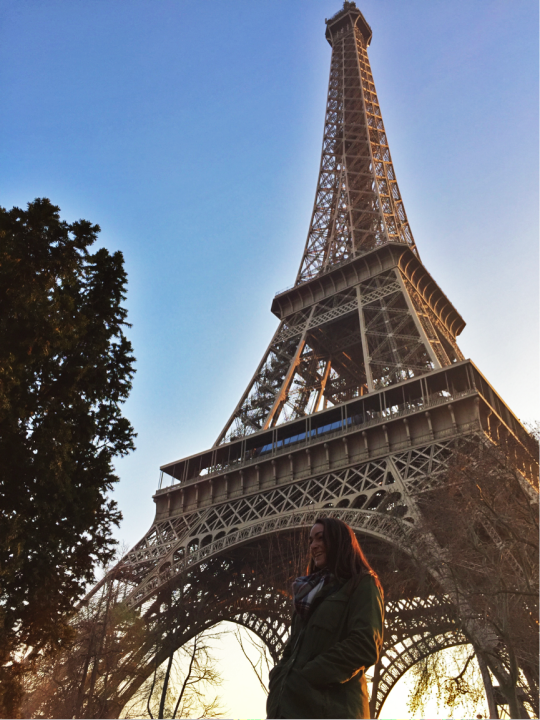
[Photo from my side trip to Paris, France]
Additionally, in my short three weeks, I’ve also had the opportunity to visit two other cities. I think that’s what baffles me most about Europe. In California, it can take you 3+ hours to get from Los Angeles to San Diego. In Brussels, all I had to do was hop on a two-hour train and I was in Paris, France. Another hour and a half and you’re in Ghent, Belgium. This weekend we have a trip planned for Venice, Italy and the weekend after we’re heading to Cologne, Germany. Oh, and did I mention round-trip travel is usually less than $70.
Of course, there are some challenges. Simple things, like going to the grocery store, are significantly more difficult here because everything is in French, and if you haven’t caught on yet, I don’t speak the best French. The time difference makes it difficult to communicate with friends from home, however our trip has already forged some pretty great friends so I haven’t had any problems with being homesick yet.
As my third week comes to a close I just wish things would slow down a little bit. I have had nothing short of an incredible time and I can’t wait to make these four months last as long as I possibly can.
To learn more about MUJA Brussels Internship Program, visit MUJA website here
0 notes
Text
It’s just the first day…
Story and Photo by Joey Gjata from Barcelona, Spain
For someone who has traveled plenty over all twenty years of my life, I don’t think I’ve met anyone who genuinely loves the initial day of a long trip – the travel day(s).
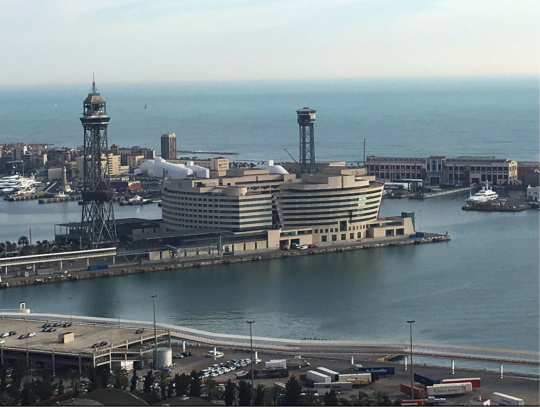
Going to Barcelona for a semester sounds exhilarating every which way you spin it, and I know it will be. But first I have to endure the transit stage. From packing a couple of days ahead(hopefully) to saying goodbye to the family at the airport security line to the long flights and their humdrum connections, that first day is a trip that seems completely separate from my coming stay in Barcelona.
I don’t know who I got the easy-to-fall-asleep-anywhere trait from, but I’d like to say thank you to that ancestor after every flight because it sure adds a little bonus to the whole travel endeavor.
However, falling into a deep sleep only to be awakened by the bright lights inside the airplane cabin doesn’t always sit well. We landed and while putting my coat and other things back in my carry-on, groggy me went right ahead and started involuntarily shoving the complimentary blankets, pillows, magazines, etc. into my bag – they’re obviously free, but why add extra weight for nothing?
Anyway, the watch reads 7:15 a.m., but my body knows well enough that it’s just past midnight. After arriving to the residence hall, I lovingly got to wait a solid hour and some change until my room was ready (I will say, though, some of the others – all girls – did have to wait hours longer for the standard double-bed rooms; I guess I’m lucky to be the only male on this program?). Early morning arrivals come replete with extra obstacles grimace.
Before you know it, orientation time hits at 3:30 p.m., and we all know that sluggish afternoon feeling all too well in our native time zones. For our sake, our program director kept the meeting short and sweet – a big thanks from everyone!

We essentially had the rest of the day to ourselves and of course, I told myself to unpack, run some errands, figure out other logistical items, etc.
But what did I do instead? You probably guessed it – sleep, a long and deep sleep. Again, my body was just as confused with the timing as my mind is formulating this post. I figured a long,hot shower would be perfect, only to find the warm water lasted a solid four and a half minutes. Looks like the Spaniards adhere to a quick shower policy.
But the fact of the matter is, it’s only the first day. Or if you like to look at things with the glass really half-full, day one doesn’t count until you wake up in Barcelona.
So, from a little past experience, keeping expectations low for today was fantastic. You get accustomed to little things one at a time. My Spanish is strong, my body will adapt, and we’ll soon begin the adventures that will last a lifetime. Always remember, it’s just the first day.
0 notes
Text
International travel is like hiking up a huge hill only to realize you're on the wrong hill
Story and photo by Madeleine Sutherland from Edinburgh, Scotland
Leaving the States on my big voyage started out fairly painlessly.
My entire family met at the airport--my sister, mom, dad and grandparents--to say goodbye, and after a few tears shed at the TSA gate and a lot of waving, I boarded my first plane to Chicago O'Hare with no troubles. The first leg of my trip was a breeze. The flight ran early and I quickly found my way to my next plane, the big international flight that would take me to Paris, France.
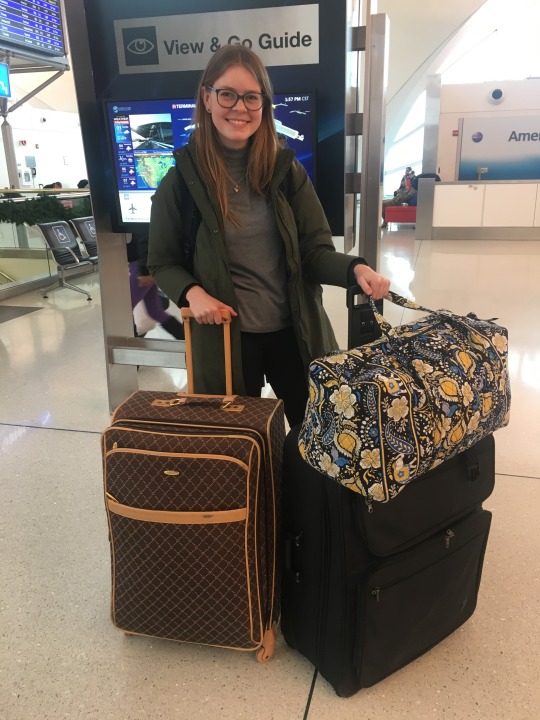
That flight also went extremely smoothly. The food was tolerable and I sat by a very quiet girl from Kentucky who was going to Paris (also to study abroad, but only for a month). She didn't speak a lick of French, but was with a group, luckily enough for her.
After landing in Paris, things got complicated.
As a recap, the two phrases I have painstakingly mumbled out the most on this trip so far are "Parlez-vous l'Anglais?" and "M'aidez-vous si'vous plait?" These are two French phrases, the first meaning "Do you speak English?" and the seconding meaning "Help me please?" I'm not sure if I'm writing them down correctly--I'm choosing to write them as I said them to various French airport officials, you know, for the sake of truth. Once I said "vous parlez" instead of "parlez-vous" to an information desk guy and he gave a pretty vicious eye roll. (Then, in a moment of clarity, I realized I should have worn a Canadian pin and picked up a northern accent. The French like Canadians. Not so much for uppity American girls with flushed cheeks and a panicked voice saying "Help me!")
When I first landed in Paris, everything seemed okay. I got on a bus and got off at a stop about three minutes down the road along with literally every other passenger on the bus. The stop was at French Customs. At that exact moment, I realized that you don't know how hard it is to navigate an airport until it's no longer in your native language. So of course, silly Madeleine accidentally exited through customs and slowly (and I mean slowly) realized I had made a mistake. Then, I had to ask how to get back to departures. I started walking. Walking turned into getting lost. In Charles de Gaulle no less, one of the busiest and most diverse international airports in the world. Cue: running around like a chicken with my head cut off. With a 30-pound backpack.
Luckily when I approached people for help most of them, realizing I am American, took pity on me and started speaking English after I muttered out my stupid phrases. After figuring out where I was supposed to be (Terminal 2E), I proceeded go through security (for the second time today), which took two hours. I learned fast how to jockey for the best place in line. Two older women in front of me were ruthlessly cutting people off right and left, including families with small children. People late for their flights by 10 or 15 minutes ducked under the tape, trying to pretend the mob of other travelers couldn't see them. Once, a group of about 10 random others followed a man who was late. He was ducking under the tape and apologizing with,"Plus tard, plus tard." (He was an obvious American, even to me. "Plus tard" means "later," not "late.") Anarchy ensued, quickly calmed down by the security personnel. Needless to say, the two pushy older women were not pleased by the lapse of order. I kept my head down and tried to figure out what language the couple behind me was speaking, in classic American tourist style.
Finally, finally I made it through security. I felt like my back was about to break. Nine hours on a plane will do you in--and did I mention the 30-pound backpack? I found my new gate (Gate K21 in the basement of Terminal 2E) and sat down right away, shedding my backpack, coat and sweater as soon as I could. I made sure for the ump-teenth time that my passport and boarding pass were intact.
Just then, as soon as I had settled and some of the blood had ran away from my cheeks, I saw a bus. The bus. The one I was supposed to stay on from my original plane after landing in Paris. It was sitting outside the window to my left. Clearly marked. And that's when I got the urge to start this post.
International travel is mind-boggling and mind-numbing. You frantically look for things you know you have because you think you've lost them. You feel like pick pockets are looming around. You practice speaking French to yourself on the plane and before you realize you're mouthing all the words, your seat partner is staring at you. You get so tired without even realizing. You forget to eat and when you do, you pick something comforting.
But eventually, you get where you're supposed to go.
Sitting in this calm section of Charles de Gaulle is making me feel a bit better. My back still hurts and I still haven't slept in a long while. But I'm getting where I'm going. After one more flight, only 1 hour and 45 minutes long, I'll be in the place I'm going to spend the next four months of my life.
And then, after settling in for the first week or two, I'm going to do the whole international travel thing again. Hopefully next time I'll remember to stay on the bus. And in the meantime, I'm going to polish up my French.
0 notes
Text
Showcasing Different Faces of America: New York City Internship
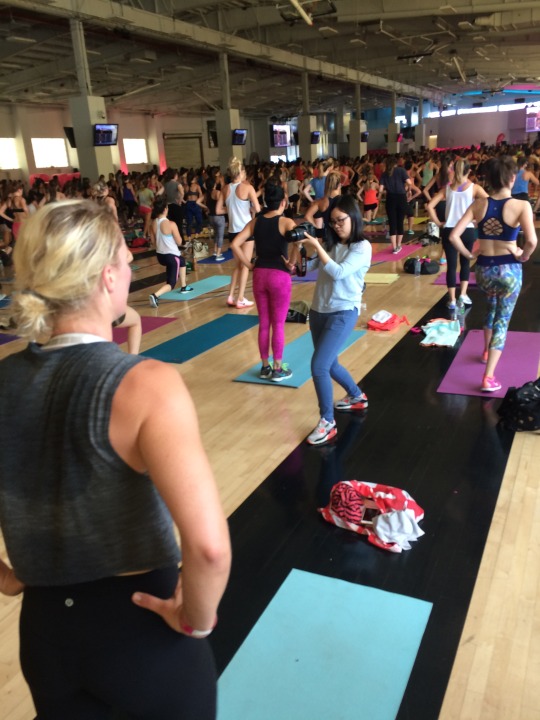
(Photo provided by Shuya Zheng)
After I made my decision to intern in a major city, I applied to both the DC and New York programs at the same time and I tried hard to find an internship in one of those cities. Since the internship I found in New York attracted me a lot, I accepted the offer and finally went to New York.
I could not find an internship until the middle of May. I was so worried about getting a job because I really needed to do an internship. When I was applying for both of the internship programs, staff members of Global Programs office helped me a lot by answering my questions via emails. I also took a lot of time polishing my resume and asked the Student Success Center for some help. I went to the Center several times to get help revising my resume. After looking at lots of internship and job websites, fortunately I got a job from one of those websites and at the end of May I went to New York.
Before going there, I was told that New York is very big and lots of fun, so I hoped I would be able to get to know more people and do some tourism in New York. I did not actually have time to be worried or excited about my journey to New York because I was in a hurry. The most important part of the application, therefore, is the timing. You also need to apply for as many positions as you can when you start to find an internship because you don’t know which position will accept you at the end. In addition, you should be very positive during the interview for your internship. So don’t forget to smile!
I think the life in Columbia is very regular - you almost do the same work every day. In New York, however, there are diverse things that capture your attention and you can learn a lot from different people. Plus, if you’re thinking of having your internship in a big city like New York, I would say you should keep your eye on the news, especially the local news when you’re in New York so that you can know what is happening in your neighborhood and be safe.
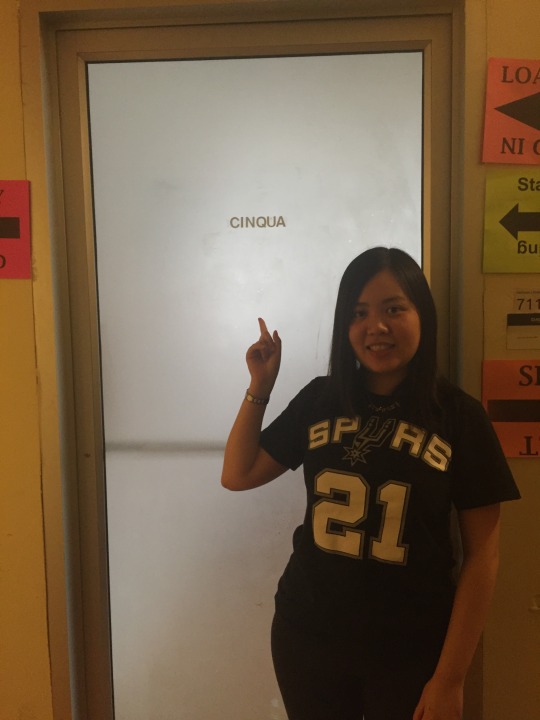
(Photo provided by Shuya Zheng)
I did my internship at a documentary agency, Cinqua, in Brooklyn, New York. The company does a lot of work in promotion for a small business and sports. My daily schedule would be editing and shooting stuff for the company. Since it is a very small company, I learned a lot from the boss in person.
Whenever I felt anxious about not getting a lot of work to do, I would ask my supervisor if I could have more work so I don’t waste my time during the internship. Furthermore, I would stay late at work at the end of each week and ask my supervisor if there was anything I can improve my work. The director of the New York Program, Reuben Stern, also asked us to do the weekly updates of our internship every week, which helped us a lot to see the progress we made and difficulties we faced during our internship so that we can improve ourselves later on.
My major here in at the Mizzou J-School is Convergence Journalism. I learned more skills for journalism such as photography and videography and got more proficiency in dealing with softwares I need like Premier Pro after doing my internship. At Mizzou I do a lot of work of typical journalism shooting stuff, while there in New York I was doing more creative shooting, which taught me other skill sets for shooting. Thanks to my internship in New York, now I know how the real journalism world works.
I highly recommend every student to go to the New York Program, especially because the curriculum of the program is very good. We had a seminar class every Tuesday and in each class our director introduced one or two students from Mizzou alumni to the class. They would guide us to know how the professional journalism looks like in New York.
I think as an international student, we want to know different faces of America. In Columbia I have gotten the chance to know how the countryside in America looks, and what life in a small city is like, but in New York City I could see how big it is and how the modern city life looks in America, which has helped me to learn more about this country.
Deadline for NYC Internship Program for this coming spring has been extended to October 17th! Apply today for this great opportunity in New York City!
Watch Shuya’s NYC story on our YouTube channel:
youtube
0 notes
Text
Close but different: Costa Rica Tour
Emma Diltz / International Print and Digital / Costa Rica Tour
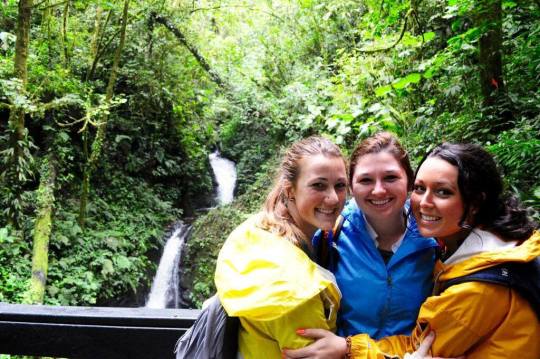
Costa Rica is a beautiful country. I didn’t know a lot about it but was interested in visiting Central America. It’s supposed to be one of the more safe Central American countries that’s not war-torn or anything like that. I knew that they had a lot of environmental issues going on, which really piqued my interest.
What I expected before going to Costa Rica was that there would be a language barrier, because although they do speak some English, it is predominantly a Spanish-speaking country. That ended up being how it was, but fortunately we worked with a translator through Monteverde Institute, the institute that we partnered with for a lot of the activities there, who was helpful.
You would hope to have a translator who is unbiased as much as possible, especially when doing journalism. There was someone else who could have done translating for us, but she had a stake in the conflict we were covering, so wouldn’t have come out as unbiased. Fortunately everything turned out great and it was a good experience to work with a translator. As a student in the International Print and Digital track, it was really interesting to be able to work with a translator and to report, because those are things that I may have to do in the future.
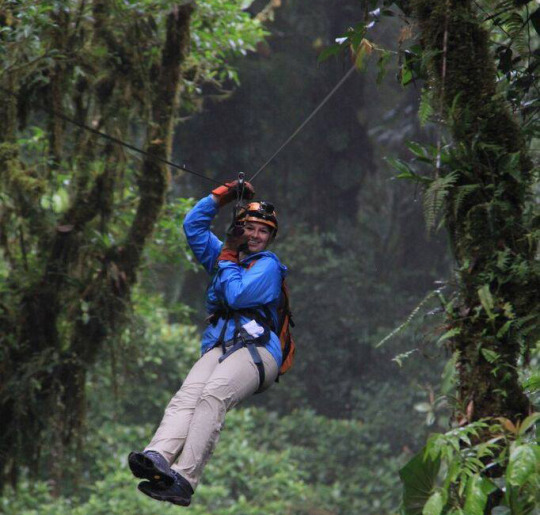
On a typical day, after having the daily excursion and doing some reports in the afternoons, we had breakout sessions, where we would talk to our professors and each other about what we did that day, what we learned, some of the struggles and good things we took away from that day.
In addition to the daily routine, we had a lot of fun ziplining on New Year’s Day, which was a fun way to ring in the New Year. We also got to try a lot of local cuisine, which was really fun because it was different than what our “authentic” Hispanic cuisine is here in the U.S. One of the funnier things that happened was when we went to a coffee farm and everyone brought bags of coffee to bring back into the United States. Some of us had to have our bags wiped down because the airport security thought it was drugs. As coffee lovers, like most journalists are, we really enjoyed getting to see things like the roasting process.
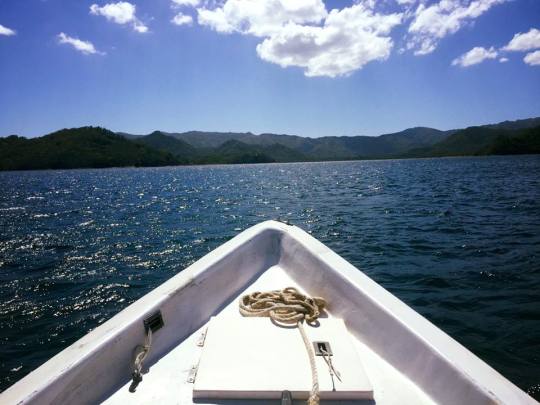
Costa Rica is still considered a developing country. Because of that, there were some villages that didn’t have air-conditioning or electricity. On the whole there were more similarities than I expected and the country was more advanced than I thought it would be, but there were some outliers.
What I was not expecting was the machismo culture; the males are still pretty dominant over the women there. We got to see firsthand how that was, and some of the ways they acted toward women were not anything we were used to. But it was really interesting to understand how women there are rising up against this and being able to help shift the culture to something that looks more like the culture we have here in the U.S.
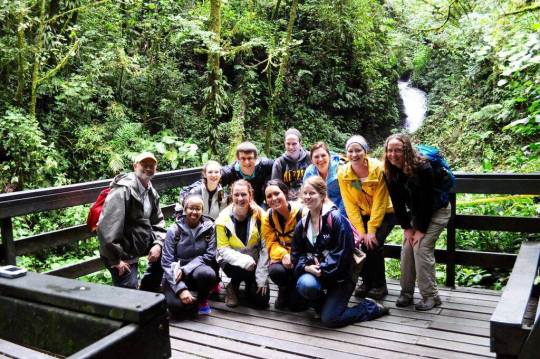
Before going to Costa Rica, I met with Tami Lorenson of the MU Journalism Abroad office and talked to her about going abroad. She advised me to go to the Study Abroad fair, where past students who studied abroad helped find more information about each program and answered more personal questions. So I have been to every Study Abroad fair and they also came into class and talked about it, which helped me learn more about the program.
The application process was not too taxing so you should have time to fit it in with your studies. If you are thinking of applying for the program, it’s great to start early so you have time to look over your essay and edit it. That also gives your professors or your references plenty of time to get those letters of recommendation, because they have busy schedules as do you, and everyone wants everything to be in on deadline.
Study abroad is a great experience and something that people in this profession need to experience to fully take advantage of the great study abroad programs we have here, as well as the many scholarships. I think they are something that everyone should take advantage of.
I would say being pushed out of your comfort zone is one of the advantages of going abroad. Especially in journalism, we are pushed into a lot of different scenarios that make us uncomfortable like talking to people who are more skeptical of the media, understanding how to work with things like that, and also being able to write on deadlines. That’s something I think not everyone learns after going through journalism school.
Watch her interview about Costa Rica on our YouTube channel!
youtube
1 note
·
View note
Text
Unforgettable summer in New York City: NY Internship program
Xinqi Zhao, Strategic Communication, New York Internship program
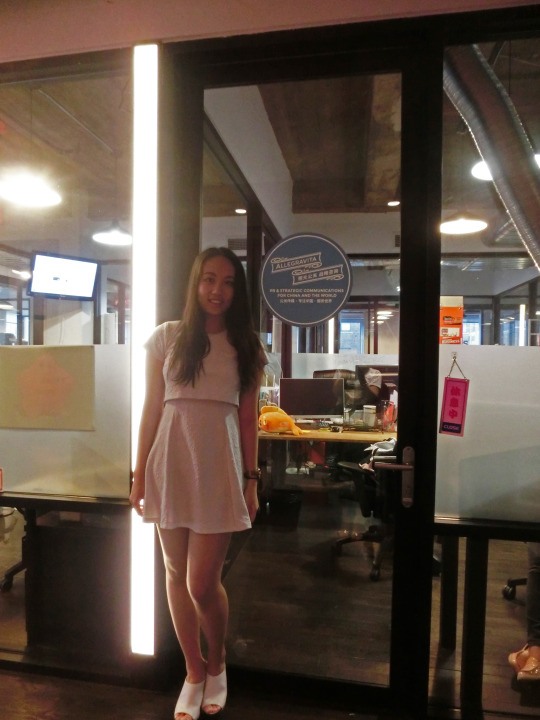
I'm a 2+2 program student From South China University of Technology and internship is mandatory for students like me to graduate. So I came to know about this program from the first week I got here in Mizzou. I started my application process from April, which was quite late, and applied to some companies but it turned out all the positions were filled by then. I would recommend that you should apply to as many companies as you can during the application process. Some of my friends actually got a really cool internship like Voice of America.
Our advisor helped me to schedule it and I went to the Global Programs fair to get some helpful information. Global Programs office sent out the list of the companies, encouraging us to apply. Don't be afraid of asking helps. In Mizzou, there are so many people that help you out with anything.
For me Washington D.C. is more like a political center and New York seems more diverse. As an international student who is not that interested in political news, I decided to go there since there are many companies dealing with strategic communication. And I also had people who have been to New York who gave me a lot helpful advice.
We were like the first dispatch of the students from Mizzou to New York so had to make our settlements in New York ourselves. It was fun actually, we had some cool media tours to Associated Press, New York Times, and Ketchup, one of the best PR agency and also had some great guest speakers for us in New York.
Even though I came from a big city in China, Canton, like New York, which is totally different from Columbia, New York is a brand-new world for me to explore. I wasn't worried too much about getting around or settling myself there, but worried about balancing between taking classes and working as a full time intern. It was quite a tight schedule and I felt like it was the transition from being a student to being a professional. I didn't have enough time to do my homework and every Tuesday I rushed to subway station to make it for the class.
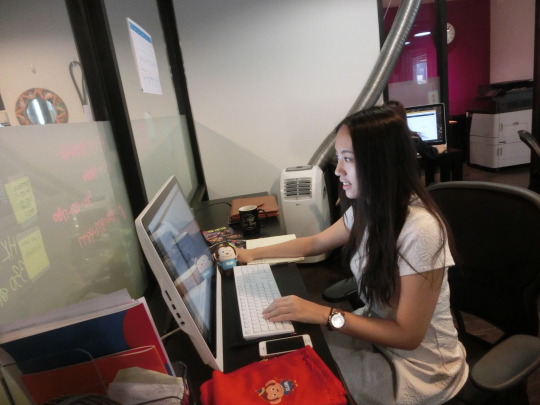
I started working in New York as a PR intern. Basically I was social media oriented, doing a lot of social media stuff. I managed several social media accounts, especially Chinese exclusive ones. Usually I work from 9 am to 6 pm, having a lot of meetings almost every morning. In the afternoon, I did social media content creation and wrote proposals for campaigns sitting in front of my computer. On Tuesdays I had a night class and some media tours happened on Wednesdays.
What makes Chinese market different is that the country has its own unique things. So I did a lot of translation to make sure non-Chinese could understand it well, which I didn't quite expect to do first. This July I became a accounting manager and our company had a lot auctions which were mostly online and needed a lot of outworks and promotions. I did a lot of campaign creation and video production. It was a challenge for me because before my internship my previous experience was mainly about dealing with financial things and I learned much about dealing with technologies working in New York.
During my internship people treated me like an intern. I'm not saying that I served them coffee or things like that. I didn't really know about the jargons and it took me a lot of time to research. For the first two weeks, I didn't really do much but just helped them out. I didn't feel like being a PR intern at first, but once I started getting involved, it changed. People probably won't notice if you don't make an effort because they're so busy with their stuff. You have to ask them if there is anything for you to do. At school you are assigned to do something. It is different.
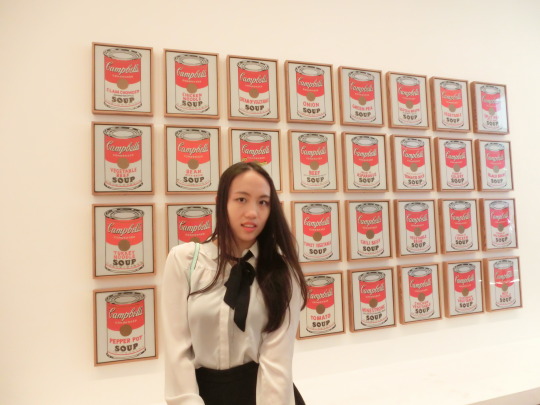
At the end of the internship I often went to Staten Island taking the ferry and subway. The free subway to Staten Island is so cool because you can see the statue of liberty on your way. The China town in New York is full of Cantonese people, nice clubs, and good restaurants and I really enjoyed myself there too. There are so many things to do for fun in New York. If you're into music, you can go to Brooklyn. or Museum, MoMA, and you can also enjoy night life. Everything happened in NY was unforgettable for me because it was so different and diverse. It must take a year to explore. Come to NY and open your eyes out of Columbia.
The most important and useful thing is that New York is huge and it's the right place for you to make connections. In strategic communication especially PR, connections are essential. You should have good relationships with media people. It is also important for international students like us. I highly recommend international students and strategic communication friends to explore the broader world in places like New York. You will know why.
Get more info about our NYC Internship program here.
2 notes
·
View notes
Text
Exploring the diversity: London
Mallory Weise, Strategy Communication, London Program
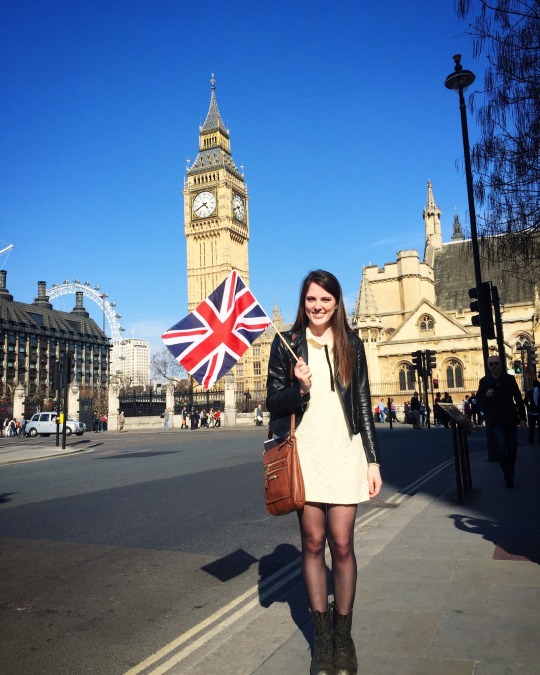
I knew I wanted to do the internship program and I wanted to do in a big city. Part of it was that I didn't speak another language so I thought that might be a good place for me. And it’s also because of such a big diversity that I knew that I wanted to be a part of that.
I had a little bit different experience than most people because my roommate's aunt is the faculty supervisor that went over one year to lead the trip. So the year before I actually studied abroad I went over and stayed with her for ten days and I got experience of what it would be like to be there. And I met some of the students on the trip and got to see where they were living. I went on the bus tour with them. So I knew immediately that it's what I wanted to do so when I saw how much fun they were having and I knew that I wanted to come back the next year.
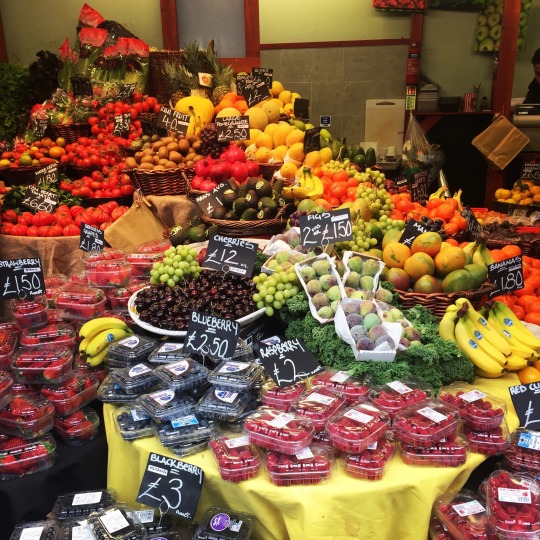
For me the application process was mostly about staying on top of everything and being super-organized and keeping all the dates. Like organizing in your calendar because there are a lot of different days things are due and different forms you have to fill out. You have to be very organized and prepared for that. But other than that, it's not hard. The whole Journalism Study Abroad faculty members are really encouraging and helpful when you need to someone to go to and ask questions about the process. Especially with the internship programs, you get the whole Mizzou Study Abroad faculty to help you out in finding a job, the place you actually fit in, which is a huge advantage. I went to the whole study abroad fair and then talked to people about different programs even though I knew which one I wanted. I went to two different individual sessions and talked to Tami about it and discussed with her the specifics of my trip in what I wanted to get out of it.
I knew my life in London would be different. I was a little surprised once I got there how different certain things were that I just had expected like they don't have dryers for your towels here to hang everything that was just a thing that I hadn't thought of. Like going to the grocery store is a lot different. They don't have the same types of food you could find here in America. So I knew it would be different but not I guess it ended up being different in the ways that I wasn't expecting.
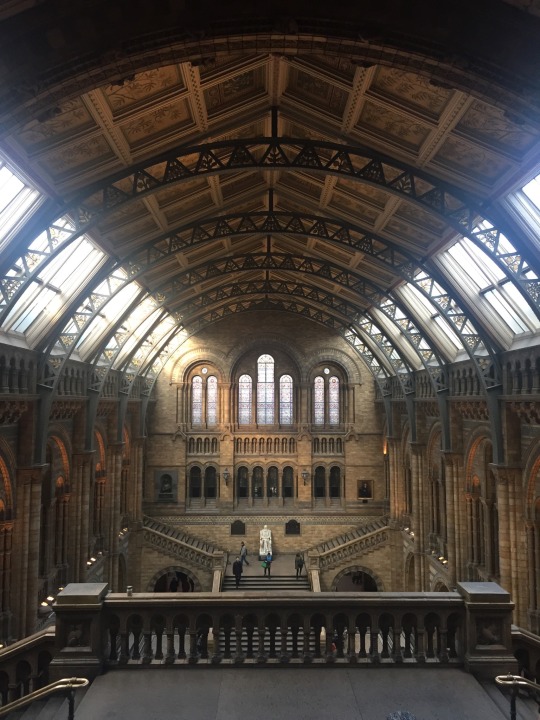
Usually, I would spend about half day at work in the morning and another half day in class. Some days I didn’t have work in the morning, or have class in the afternoon, so when that would happen I would usually take that half day and go see a museum, or go to lunch with my friends, or do something in the city.
I took two journalism courses and one like British culture and life class. For both of them it ended up going on a lot of field trips, which I didn't know was going to happen when I went over there. We visited the BBC headquarters, the Guardian headquarters, and a magazine. We got a taste of what it's like to work at one of those institutions in a big, global city.
For the British culture class, we had a British professor and he taught us about the culture, the history, the music of living in England and living in London. We got to go on a bunch of field trips. We visited a really famous cemetery, and we visited Brighton, which is about an hour away. We got to take the train and go see the sea. We got a lot of field trips and some projects. There wasn't as much course work as like you would get at a class at Mizzou because they knew you were here to experience living there and to travel so they made sure that we weren't writing as many papers. We were doing projects where we got to go out and do things.
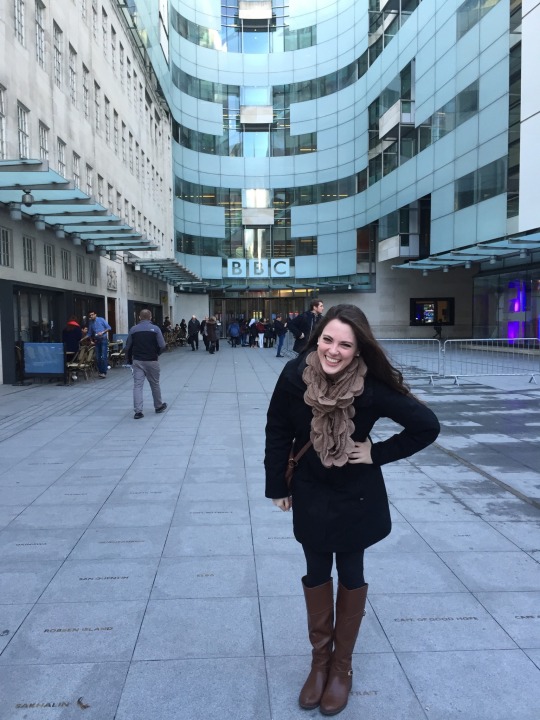
One of the projects we had to do was you just got to pick whatever topic you're interested in and come up with like a website on it and you're paired with two other people. My group did our project on markets in London so we went around exploring three different markets, took a bunch of pictures, and wrote the history and different character of each one, which was really fun as we got to go out and actually tour the markets, going through them, seeing what they are all about. I would say when you get the chance to do a project, pick something you’re super interested in because that’s how you’ll learn more about the city and yourself and it’ll be more fun.
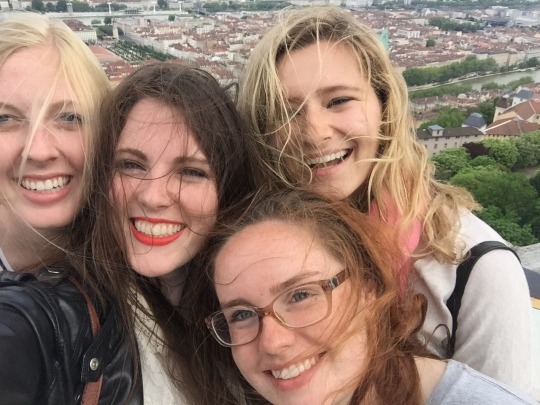
When I wasn't in class I tried to go to a lot of museums because they're free in London, which I thought was really great. I love art museums so I tried to do them over the courses' semester. I also liked going out to eat at different places, because it’s such a big, global city and they have such a diverse population that there are so many places to get authentic food, and it was really delicious. And I liked going to all the markets that is why I did my project on it because they are so vibrant and different from anything we have here that exploring each one was a total experience of being in a mini city inside a big one.
The organization that set up our program, Kappa, held a trivia night one day. We went and ended up winning the tickets to go up and see the skyline of London from way high up in a giant building in downtown, which looks like a big shard of glass. That was something that I wanted to do and the tickets are really expensive normally. But we got the chance for free. We also took our two professors with us as a way to say "thank you for this awesome semester." We went up at sunset, and saw the city transition from being this beautiful bright city to what it looks like in darkness, and it was all sparkly, and it was probably my favorite experience.
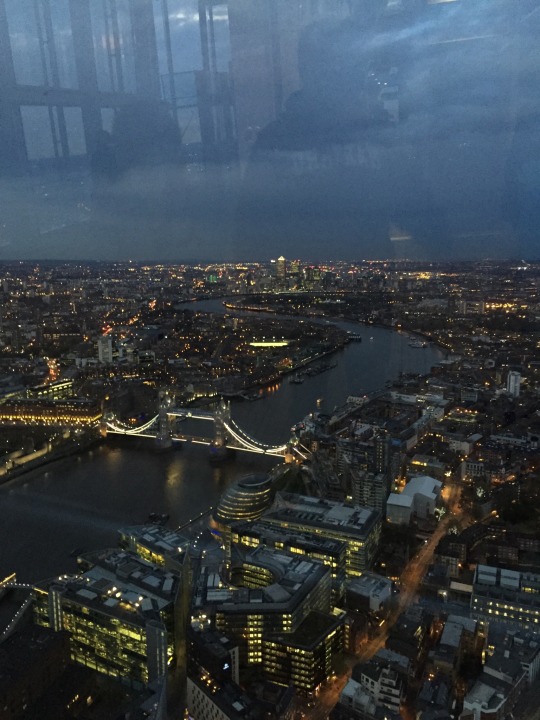
If you are ready to go out of Columbia and take your chance to explore the world, I would say definitely go talk to someone who has been on a trip before because that is the way I got most excited about going on this trip, learning and talking to other students who had been on it before. That helped me decide where to go.
youtube
Check out her interview video with MUJA on YouTube
0 notes